category-award.php
single-award.php
JACIII Best Paper, Young Researcher, and Best Review Paper Awards 2025
JACIII BEST PAPER AWARD 2025 Electroencephalography Emotion Recognition Based on Rhythm Information Entropy Extraction Zhen-Tao Liu, Xin Xu, Jinhua She, Zhaohui Yang, and Dan Chen |
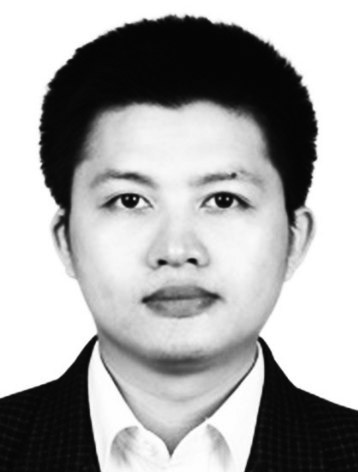 | 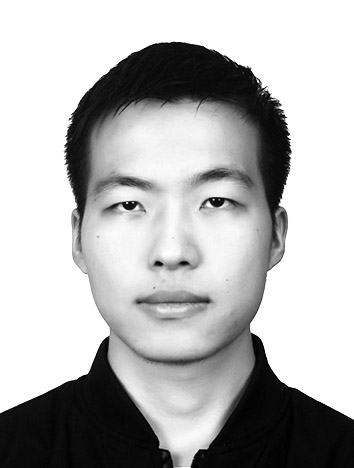 | 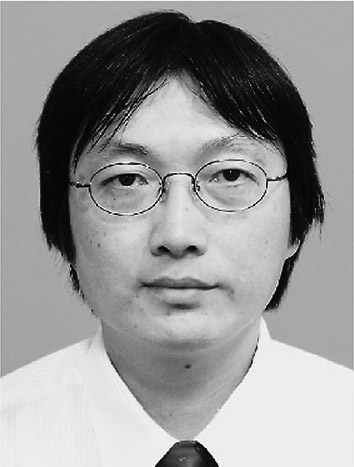 | 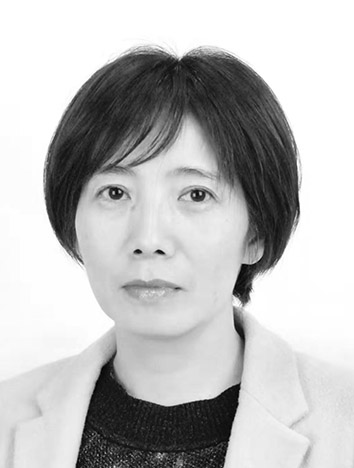 | 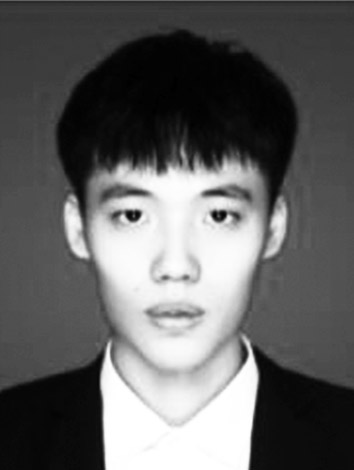 |  |
| Zhen-Tao Liu China University of Geosciences | Xin Xu China University of Geosciences | Jinhua She Tokyo University of Technology | Zhaohui Yang Huazhong University of Science and Technology | Dan Chen China University of Geosciences |
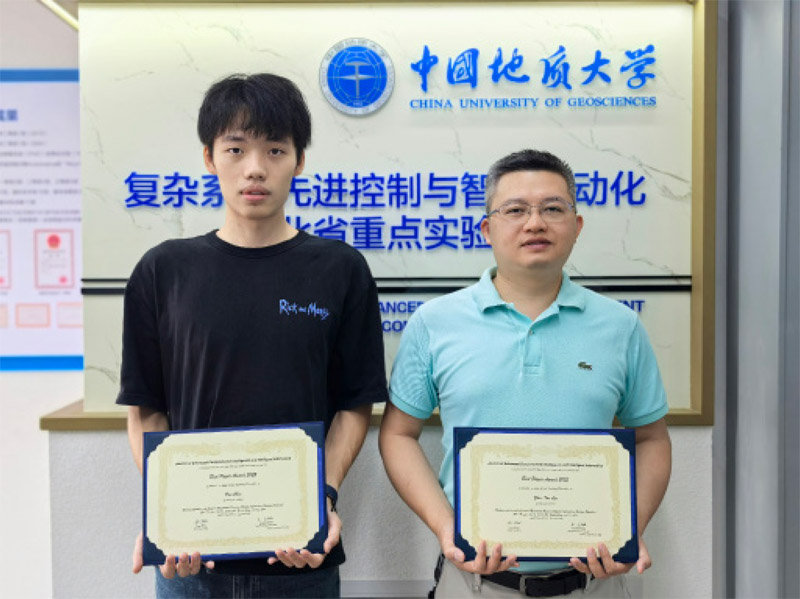
Photo: (From left to right) Mr. Dan Chen and Prof. Zhen-Tao Liu received certificates of the JACIII Best Paper Award 2025..
Message from the Winner
We are deeply honored to receive the 2025 JACIII Best Paper Award for our paper titled “Electroencephalography Emotion Recognition Based on Rhythm Information Entropy Extraction.” We extend our sincere gratitude to the JACIII editorial board and reviewers for their valuable suggestions and comments, which significantly contributed to improving the quality of the paper. This paper presents a novel method for EEG channel selection by analyzing their rhythm specificity. Compared with existing approaches, the proposed method accurately selects key emotional representation channels for different emotional states. This technique supports efficient emotion recognition based on EEG signals, requiring only a small volume of data, thereby simplifying future implementation in human-machine systems.
This research is an extension of the doctoral work conducted by Prof. Zhen-Tao Liu, one of the authors, at the Hirota Lab, Tokyo Institute of Technology (now Institute of Science Tokyo). This achievement is also part of the Wuhan Applied Foundational Frontier Project and represents an internationally successful collaboration between China and Japan. This award embodies the collective efforts of our entire research team.
This recognition inspires us to continue pursuing innovative research and to collaborate further with JACIII to jointly promote the advancement of computational intelligence. Once again, we extend our heartfelt gratitude for bestowing this esteemed honor.
JACIII YOUNG RESEARCHER AWARD 2025 Development of a Living Laboratory to Verify Assistive Technology in Simulated Indoor and Outdoor Spaces Kenji Kato, Tatsuya Yoshimi, Daiki Shimotori, Keita Aimoto, Naoki Itoh, Kohei Okabe, Naoyuki Kubota, Yasuhisa Hirata, and Izumi Kondo |
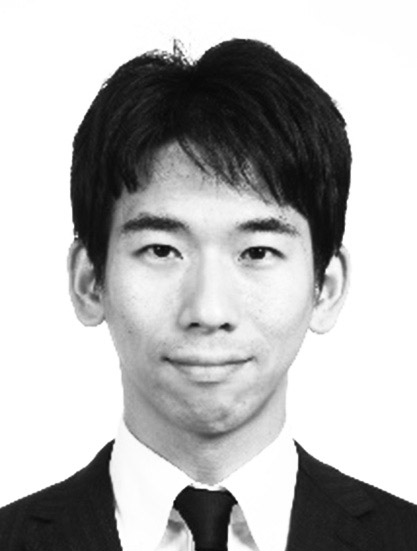 |  |
| Kenji Kato National Center for Geriatrics and Gerontology |
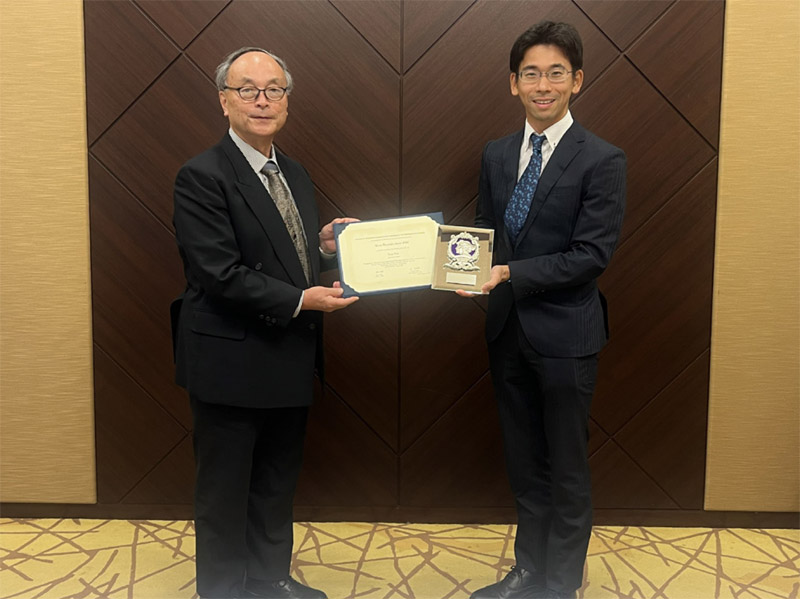
Photo: Dr. Kenji Kato received a certificate and a plaque of the JACIII Young Researcher Award 2025 from Prof. Kaoru Hirota (Editor-in-Chief).
Message from the Winner
I am deeply honored to receive the JACIII Young Researcher Award 2025. I express my sincere gratitude to the selection committee, reviewers, and collaborators who supported this study.
The awarded paper, “Development of a Living Laboratory to Verify Assistive Technology in Simulated Indoor and Outdoor Spaces,” describes the construction of an integrated experimental environment, the Living Lab, that enables the verification of assistive robots and wearable support technologies in realistic daily living settings. By incorporating both indoor and outdoor simulation areas, including sloped walkways and a fall-impact mitigation suspension system, the laboratory provides a unique platform for the comprehensive evaluation of human–robot interactions and safety performance in life-like environments.
The Living Lab serves not only as a technological testbed but also as a collaborative hub that brings together researchers from diverse fields such as engineering, biomechanics, rehabilitation, and gerontology. Collaborative studies with universities and research institutes have been particularly stimulating, allowing us to explore new methodologies that bridge the gap between laboratory research and real-world implementation.
Through this research, we aimed to present a practical model for motion analysis and robotic validation in everyday spaces using markerless motion capture and assistive lifting systems. I strongly believe that these Living Lab-based approaches will play an increasingly important role in accelerating the social implementation of assistive and monitoring technologies in aging societies.
This award encourages me to continue advancing research, practice, and education in an integrated manner, contributing to the society, nurturing the next generation of researchers, and expanding the frontiers of human–robot coexistence science. I would like to reiterate my heartfelt appreciation for this honor.
JACIII BEST REVIEW PAPER AWARD 2025 Beyond Sentiment Analysis: A Review of Recent Trends in Text Based Sentiment Analysis and Emotion Detection Lai Po Hung and Suraya Alias |
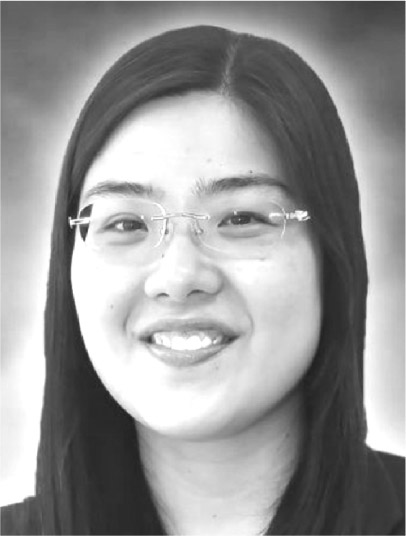 | 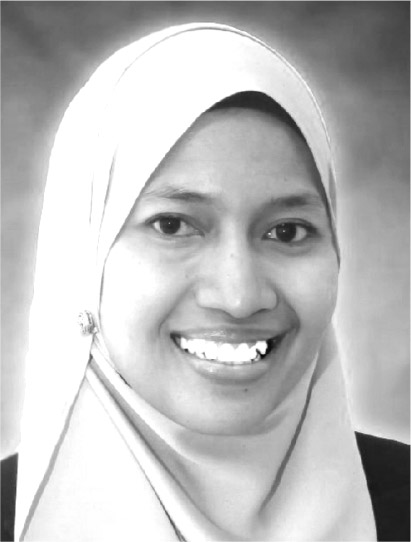 |  |
| Lai Po Hung Universiti Malaysia Sabah | Suraya Alias Universiti Malaysia Sabah |
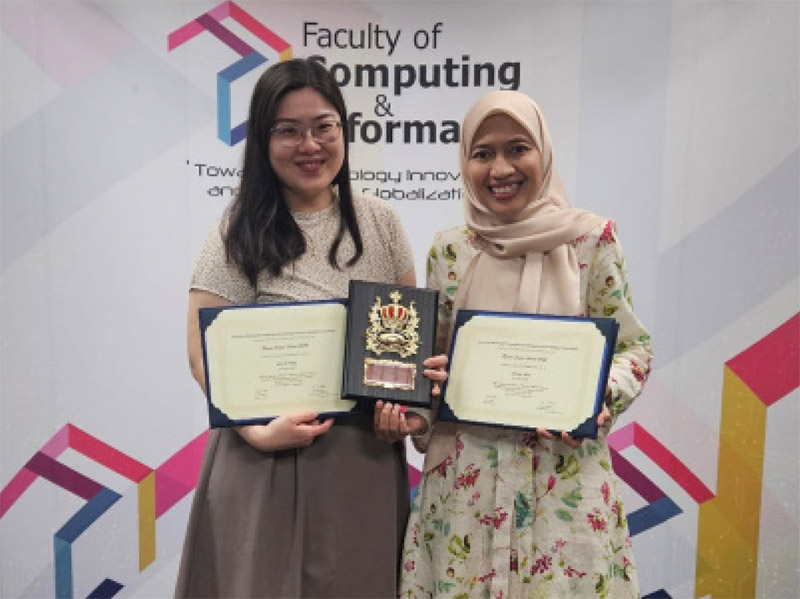
Photo: (From left to right) Dr. Lai and Dr. Suraya holding a plaque and certificates of the JACIII Best Review Paper Award 2025.
Message from the Winner
We are deeply honored to receive the JACIII Best Review Paper Award 2025 and would like to express our sincere gratitude to the award committee, editorial board, reviewers, and peers for this recognition.
The awarded review paper, titled “Beyond Sentiment Analysis: A Review of Recent Trends in Text Based Sentiment Analysis and Emotion Detection,” explores recent advancements and emerging trends in text-based sentiment analysis and emotion detection. Our goal was to examine current developments, highlight key challenges, and identify opportunities for future research in this ever-evolving field. It is gratifying to know that our efforts contribute meaningfully to the academic community and encourage further exploration in field of text mining.
This recognition highlights the essential role that review papers play in advancing scientific understanding and encourages continued efforts toward interdisciplinary collaboration and innovation. Our research interests span various aspects of text mining, including applying sentiment analysis and emotion detection not only for opinion mining and consumer satisfaction, but also for community-centered efforts such as detecting depression, stress, and anxiety. We remain committed to fostering thoughtful and accessible research that supports the academic community growth at every level.
Thank you again for this honor. This inspires us to continue pursuing research and innovation that makes a difference, and to actively contribute to the growth and evolution of our field.
single-award.php
JACIII Best Paper and Young Researcher Awards 2024
JACIII BEST PAPER AWARD 2024 Toward Question-Answering with Multi-Hop Reasoning and Calculation over Knowledge Using a Neural Network Model with External Memories Yuri Murayama and Ichiro Kobayashi |
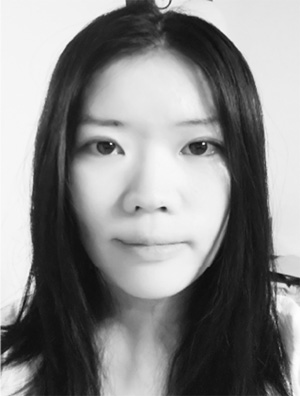 | 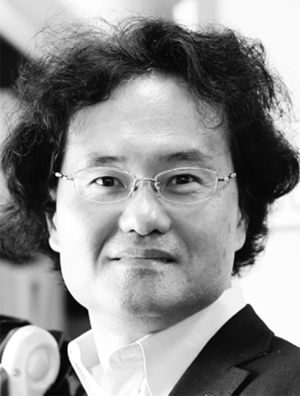 |  |
| Yuri Murayama Ochanomizu University | Ichiro Kobayashi Ochanomizu University |
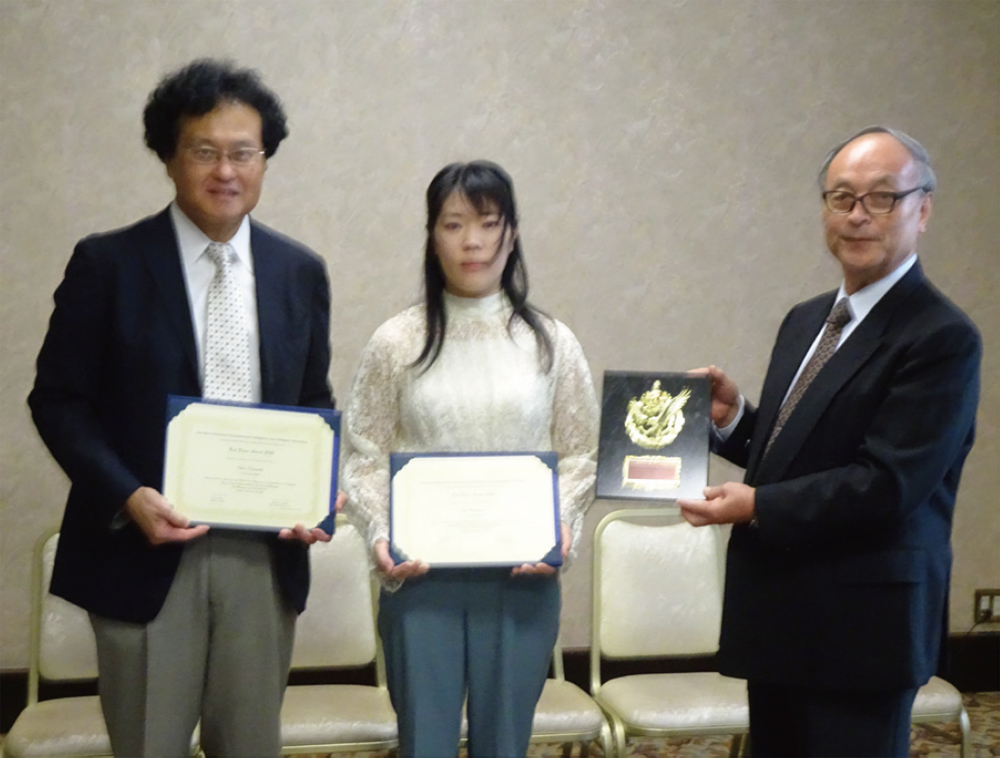
Photo: From Prof. Kaoru Hirota, the JACIII Editor-in-Chief, Prof. Ichiro Kobayashi and Dr. Yuri Murayama received a plaque and certificates of the JACIII Best Paper Award 2024.
Message from the Winner
We are deeply honored to receive the JACIII Best Paper Award 2024. We would like to express our sincere gratitude to the reviewers, JACIII editorial office, and Fuji Technology Press for their generous support. The differentiable neural computer (DNC) proposed by Graves et al. is a neural network model with addressable external memory that can solve algorithmic and question-answering tasks. The DNC realizes question answering with premises by writing an input sequence into the memory and reading the necessary information to infer the answer from the memory. However, integrating structured knowledge and calculations into DNC models remains challenging. In our study, we incorporated an architecture for knowledge and calculations into DNC models to improve their ability to generate correct answers to questions with multi-hop reasoning and to provide calculations over structured knowledge. Consequently, our improved DNC models achieved the best accuracy for complex questions requiring multi-hop reasoning and proper calculations over knowledge. We hope that our work will contribute to the field of artificial intelligence research and that this area will continue to advance.
JACIII YOUNG RESEARCHER AWARD 2024 Human Pose Estimation with Multi-Camera Localization Using Multi-Objective Optimization Based on Topological Structured Learning Takenori Obo, Kunikazu Hamada, Masatoshi Eguchi, and Naoyuki Kubota |
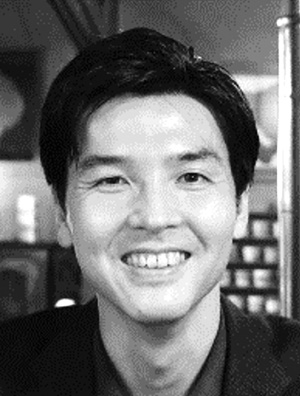 | 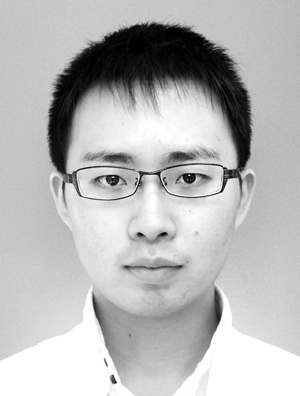 | 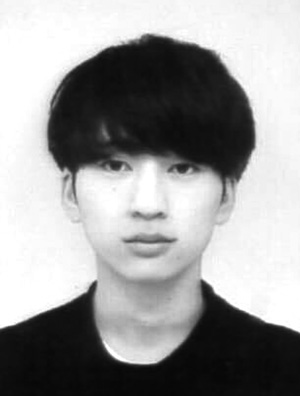 | 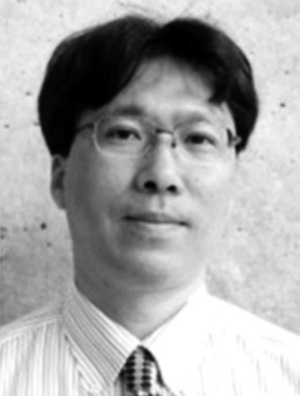 |  |
| Takenori Obo Tokyo Metropolitan University | Kunikazu Hamada Tokyo Metropolitan University | Masatoshi Eguchi Tokyo Metropolitan University | Naoyuki Kubota Tokyo Metropolitan University |
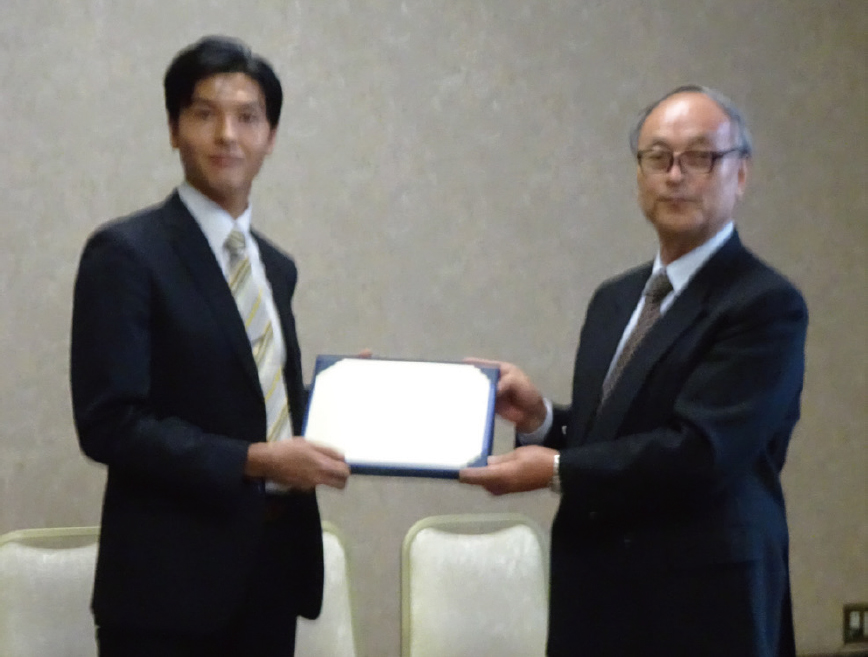
Photo: Dr. Takenori Obo received a certificate and a plaque of the JACIII Young Researcher Award 2024.
Message from the Winner
I am deeply honored to receive the “JACIII Young Researcher Award 2024.” I sincerely thank the selection committee, reviewers, and co-researchers for their invaluable assistance.
The winning paper, “Human Pose Estimation with Multi-Camera Localization Using Multi-Objective Optimization Based on Topological Structured Learning,” proposes a method for 3D pose estimation that uses joint angle estimation and self-localization of each camera using multiple smart devices equipped with 2D skeleton detection libraries. This study uses a multi-island genetic algorithm to optimize the joint angles of a kinematic model representing human posture, as well as the relative angles of each camera from the subject’s perspective. In addition, to improve the genetic algorithm’s search efficiency, we implemented a structured learning method based on topological mapping. This method maintains the estimated poses as reference vectors, allowing the genetic algorithm to use them as search points.
Marker-less motion capture systems used in rehabilitation and caregiving settings are frequently expensive, making it challenging to analyze human motion easily. We believe that the proposed system will provide significant assistance in these areas. This award motivated me to continue working in practice, research, and education, with the goal of contributing to society, developing talent, and advancing academic fields. I would like to express my heartfelt gratitude once more for this award.
single-award.php
JACIII Best Paper and Young Researcher Awards 2023
JACIII BEST PAPER AWARD 2023 Visualization Method Corresponding to Regression Problems and Its Application to Deep Learning-Based Gaze Estimation Model Daigo Kanda, Shin Kawai, and Hajime Nobuhara |
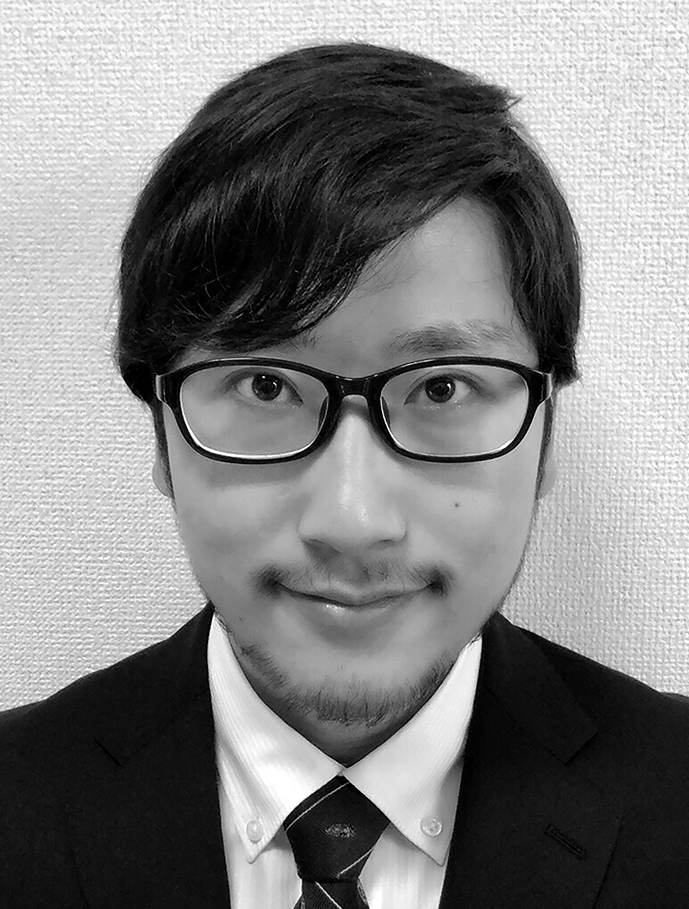 | 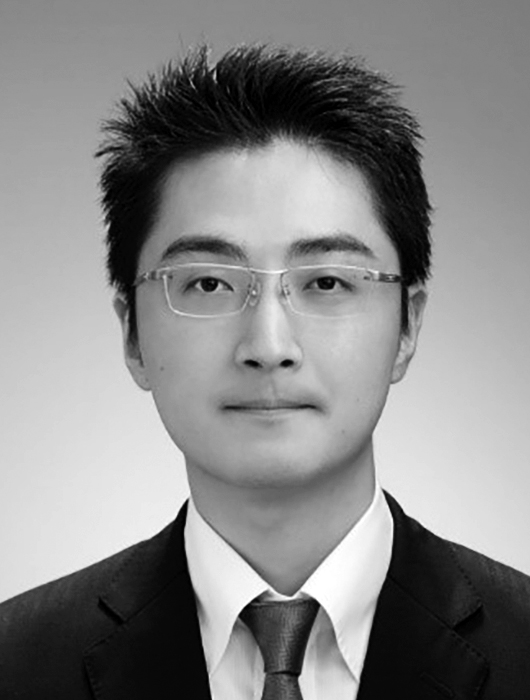 | 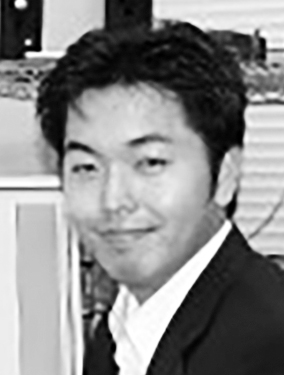 |  |
| Daigo Kanda University of Tsukuba | Shin Kawai University of Tsukuba | Hajime Nobuhara University of Tsukuba |
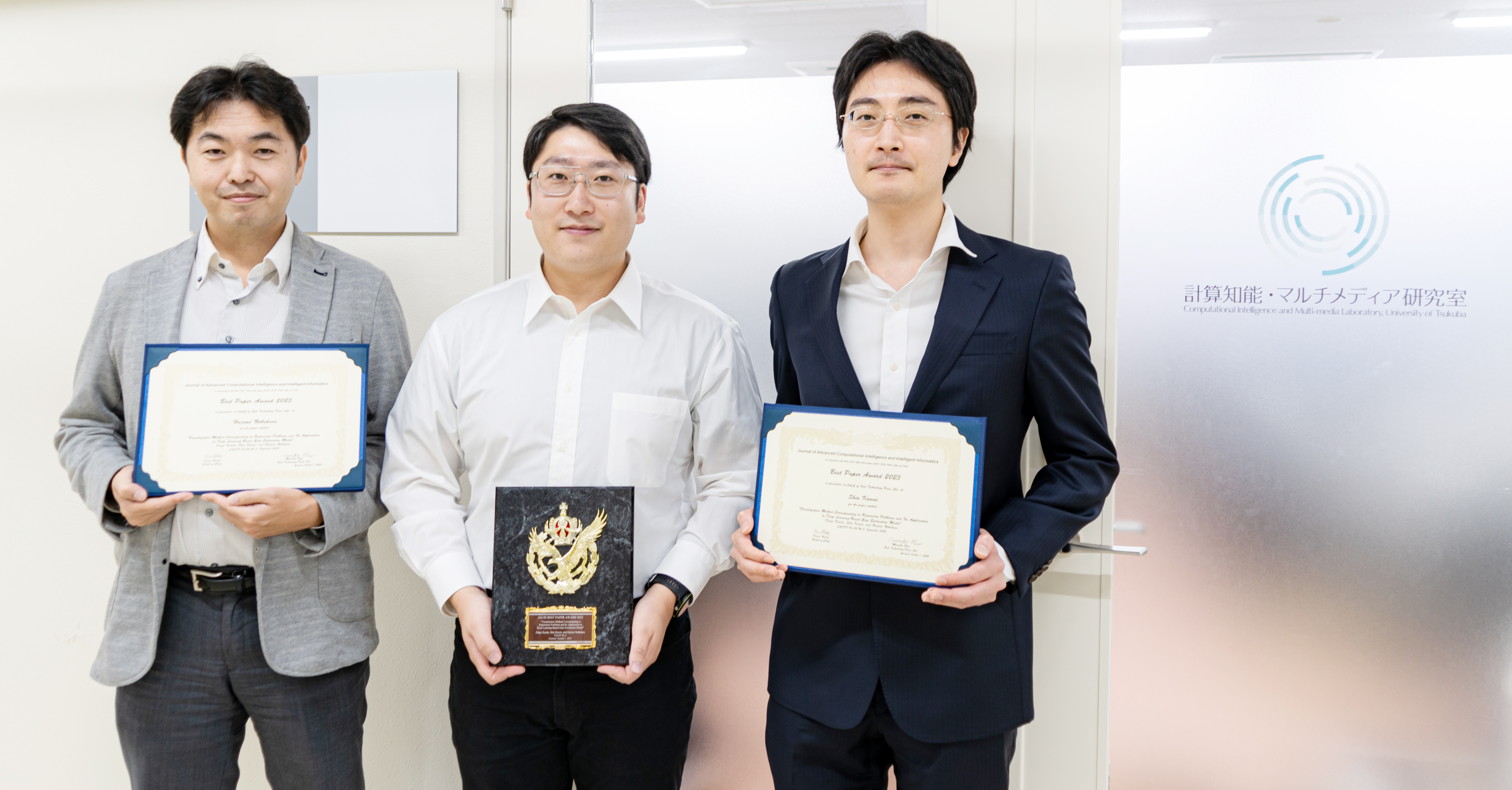
Fig. (From left to right) Prof. Hajime Nobuhara, Mr. Daigo Kanda, and Dr. Shin Kawai received a plaque and certificates of the JACIII Best Paper Award 2023.
Message from the Winner
We are truly humbled and deeply honored to have been chosen as recipients of the JACIII Best Paper Awards for 2023. This recognition is not only a testament to our team’s dedication and hard work but also a reflection of the collective efforts and encouragement from the wider research community. We would like to extend our profound gratitude to the esteemed members of the JACIII Editorial Committee, the dedicated administrative staff, the meticulous reviewers, and every individual who has supported and championed this journal.
The awarded papers focus on adapting the widely-used techniques in explainable AI, Gradient-weighted Class Activation Mapping (Grad-CAM), to address regression problems. Moreover, they address significant challenges of deep learning-based gaze estimation algorithms: the black-box problem.
Through these studies, we believe we have expanded the applicability of explainable AI and contributed to the development of AI systems that humans can trust.
We anticipate that the domain of human-centered AI will continue to expand, and the fields exploring these areas will become increasingly diverse. Journals such as the JACIII, which cover a broad range of topics from foundational to applied research, will undoubtedly grow in significance for researchers like us.
We are committed to advancing research of the highest caliber and meeting the expectations of all stakeholders. We would like to express our heartfelt gratitude for these prestigious awards.
JACIII YOUNG RESEARCHER AWARD 2023 LSTM Network Classification of Dexterous Individual Finger Movements Christopher Millar, Nazmul Siddique, and Emmett Kerr |
 |  |  |  |
| Christopher Millar Faculty of Computing, Engineering and Built Environment, Ulster University | Nazmul Siddique Faculty of Computing, Engineering and Built Environment, Ulster University | Emmett Kerr Faculty of Computing, Engineering and Built Environment, Ulster University |
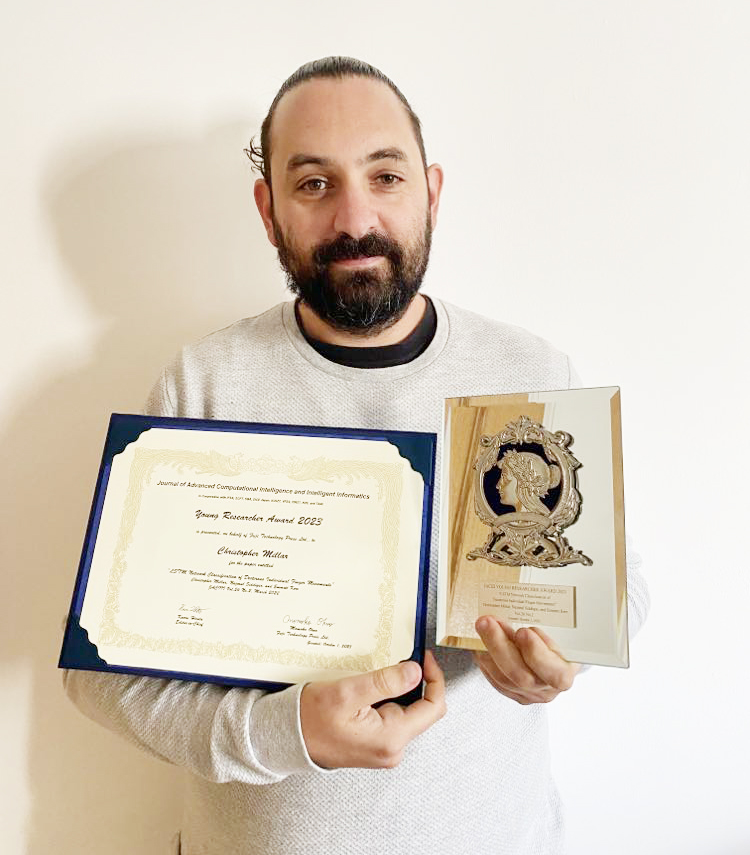
Fig. Mr. Christopher Millar holding a plaque and a certificate of the JACIII Young Researcher Award 2023.
Message from the Winner
Hello fellow researchers and academics,
I would like to take this opportunity to thank the JACIII and Fuji Technology Press for publishing my paper and giving me the prestigious award of “Young Researcher Award 2023.” It is a privilege and an honor for my work to be showcased in the JACIII and to present at the associated CCS conference. Our paper, “LSTM Network Classification of Dexterous Individual Finger Movements,” was the first that was produced as part of my research into using LSTM networks to classify sEMG signals. Typically, this type of network has been applied to natural language processing or other sequential data sequences, but we have applied it to bio-signal classification. This was the first step toward achieving our goal of developing a system that can classify complex hand gestures and other grasping movements for potential application with anthropomorphic robotic hands.
Furthermore, I would like to thank the team of editors that provided me with crucial feedback throughout the submission process and helped me to refine my submission. I would also like thank everyone who read my paper and found it helpful or of some interest. Finally, I wish to thank my family for supporting me throughout this process and my supervisors for helping me write a paper worthy of such an award.
JACIII YOUNG RESEARCHER AWARD 2023 Automatic Neonatal Alertness State Classification Based on Facial Expression Recognition Kento Morita, Nobu C. Shirai, Harumi Shinkoda, Asami Matsumoto, Yukari Noguchi, Masako Shiramizu, and Tetsushi Wakabayashi |
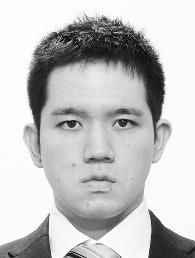 | 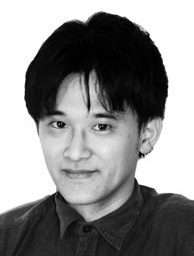 | 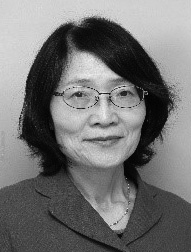 | 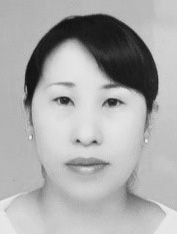 |  | 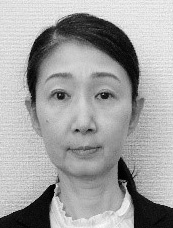 | 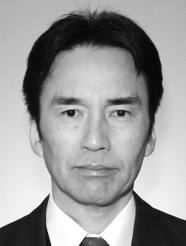 |  |
| Kento Morita Graduate School of Engineering, Mie University | Nobu C. Shirai Center for Information Technologies and Networks, Mie University | Harumi Shinkoda Kagoshima Immaculate Heart University | Asami Matsumoto Suzuka University of Medical Science | Yukari Noguchi St. Mary College | Masako Shiramizu Kyushu University Hospital | Tetsushi Wakabayashi Graduate School of Engineering, Mie University |
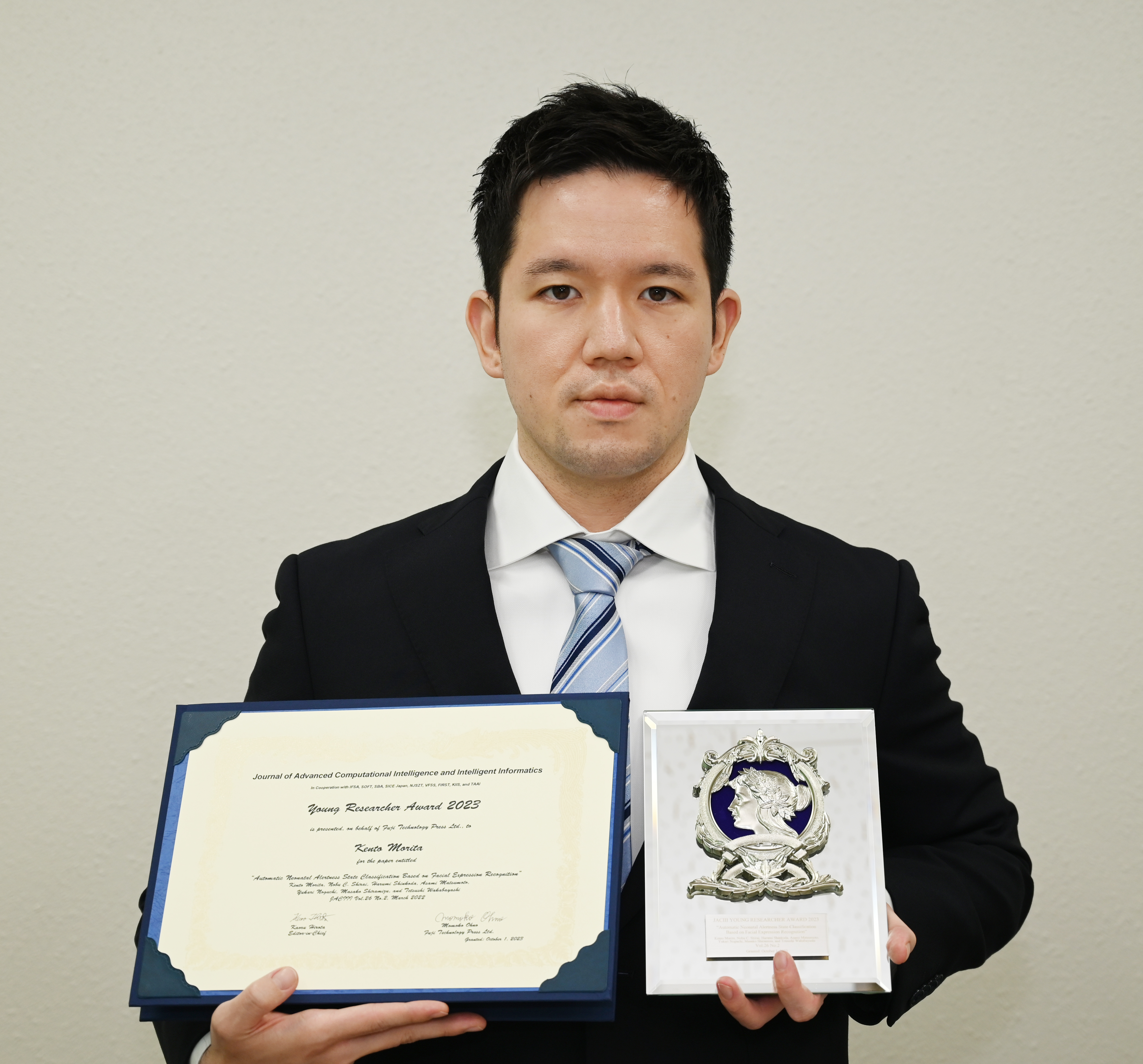
Fig. Dr. Kento Morita holding a plaque and a certificate of the JACIII Young Researcher Award 2023.
Message from the Winner
I am immensely proud to have received the JACIII Young Researcher Award 2023. I would like to express my gratitude to the JACIII editorial board, award committee members, and co-authors.
Our paper, entitled “Automatic Neonatal Alertness State Classification Based on Facial Expression Recognition,” proposes a video image analysis and machine learning classification system, based sleep-wake states, for neonates in neonatal intensive care unit.
Based on Brazelton’s alertness definitions, the proposed method uses machine learning to categorize sleep-wake states into four or six classes. Since the input data are the video images of neonates, the proposed method extracts the histogram of oriented gradients (HoG) or the gradient feature from each slice, and these are then merged in an average merge or a standard deviation merge. The experimental results show that the weighted support vector machine classifier using the HoG feature and average merging achieves the highest classification performance.
We are currently working on developing a hybrid model that combines facial expression and body motion for the alertness state classification. Lastly, I am considering continuing our collaborative research in the medical engineering field in the future.
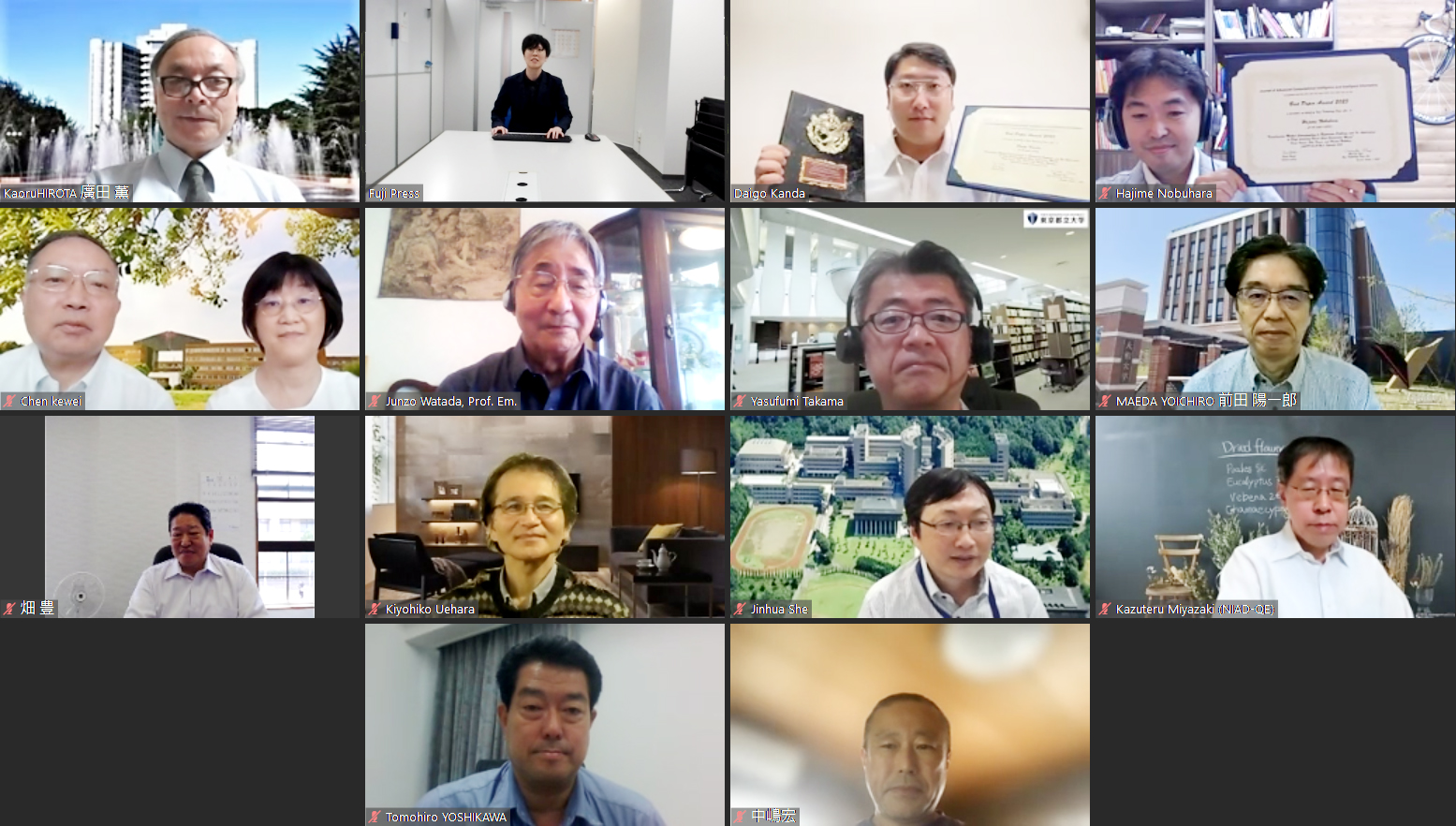
Fig. The winner of the Best Paper Award, editorial boards, and editorial staff on the online ceremony. First row from left to right: Prof. Kaoru Hirota (Editor-in-Chief), editorial staff, Mr. Daigo Kanda (the BPA winner), and Prof. Hajime Nobuhara (the BPA winner). Second: Prof. Kewei Chen, Dr. Fangyan Dong, Prof. Junzo Watada, Prof. Yasufumi Takama, and Prof. Yoichiro Maeda. Third: Prof. Yutaka Hata, Prof. Kiyohiko Uehara, Prof. Jinhua She, and Prof. Kazuteru Miyazaki. Fourth: Prof. Tomohiro Yoshikawa, and Dr. Hiroshi Nakajima.
single-award.php
JACIII Best Paper and Young Researcher Awards 2022
JACIII BEST PAPER AWARD 2022 Three-Mode Fuzzy Co-Clustering Based on Probabilistic Concept and Comparison with FCM-Type Algorithms Katsuhiro Honda, Issei Hayashi, Seiki Ubukata, and Akira Notsu |
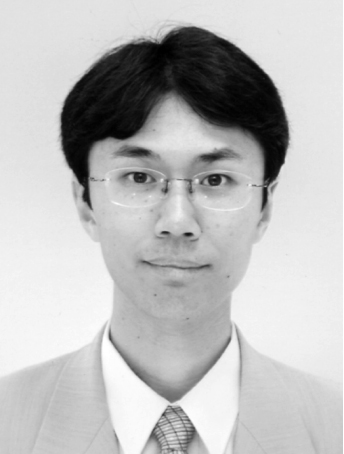 | 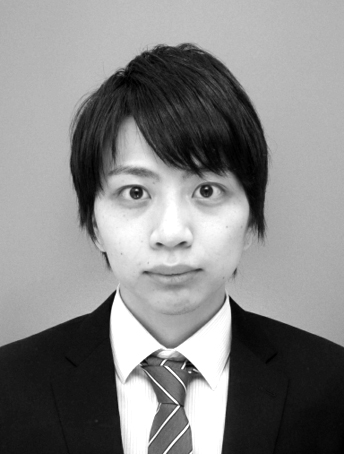 | 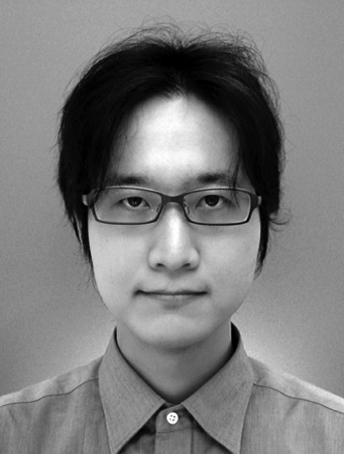 | 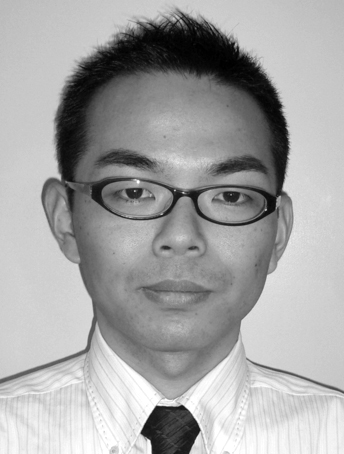 |  |
| Katsuhiro Honda Osaka Prefecture University | Issei Hayashi Osaka Prefecture University | Seiki Ubukata Osaka Prefecture University | Akira Notsu Osaka Prefecture University |
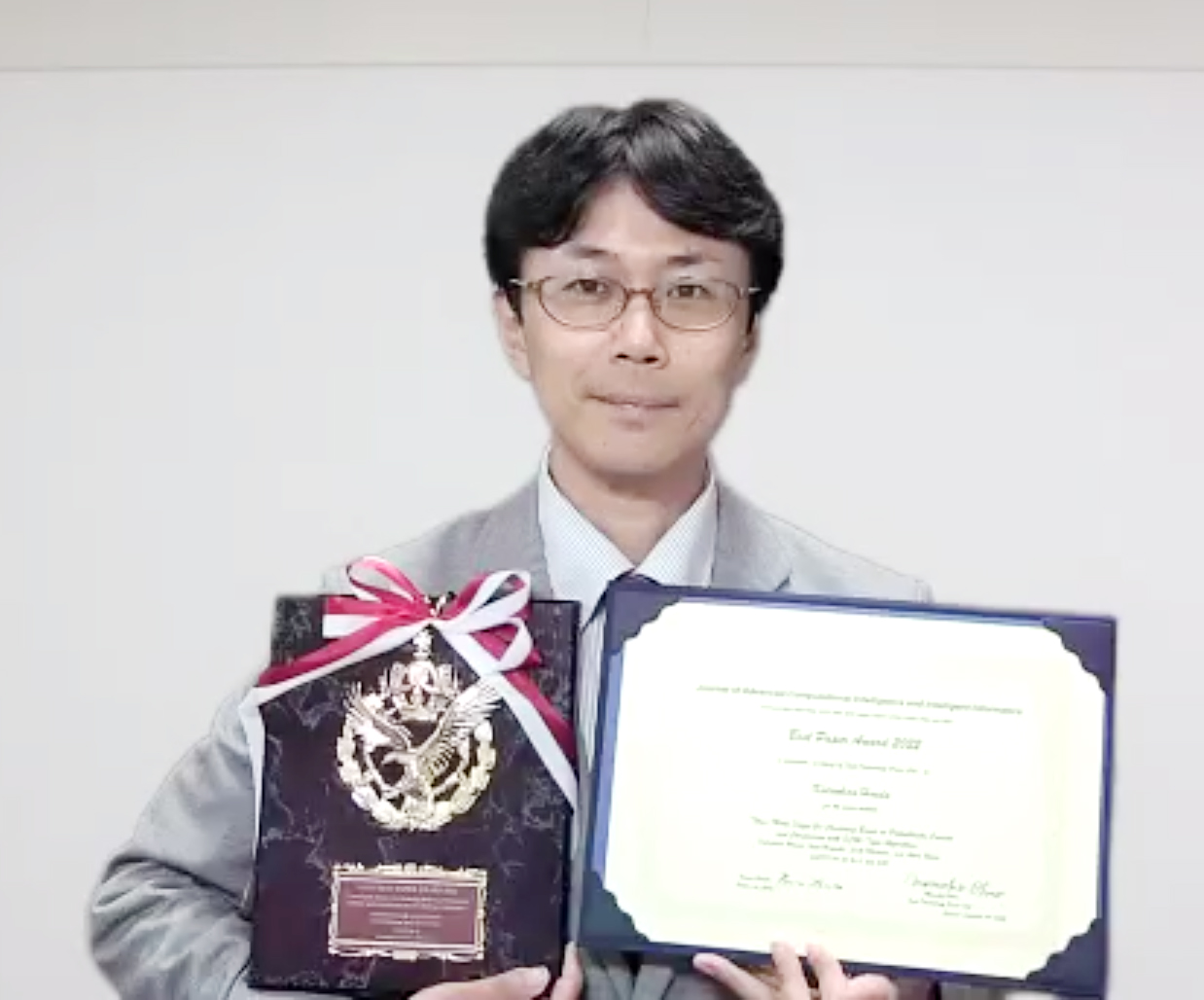
Fig. Prof. Katsuhiro Honda received a plaque and a certificate of the JACIII Best Paper Award 2022 on behalf of the authors.
Message from the Winner
It is our great honor to be selected for the JACIII’s Best Paper Award 2022, and we would like to express our sincere appreciation to the JACIII editorial board and office members, the reviewers, and all the supporters of this journal. Our paper, “Three-Mode Fuzzy Co-Clustering Based on Probabilistic Concept and Comparison with FCM-Type Algorithms,” was first motivated by our desire to utilize three-mode co-occurrence information in collaborative recommendations, such that personalized food recommendations can be realized by considering not only user-food preference tendencies but also intrinsic user-ingredient preferences. In the proposed method, fuzzy partitioning is achieved by introducing a probabilistic concept into a fuzzy c-means type of clustering, and the degree of partition fuzziness can be tuned through comparison with the fuzziness degree of probabilistic models. The proposed method is therefore supported by the advantages of both fuzzy set theory and probability theory, and it is expected to develop a new direction in fuzzy-probability hybridization.
Finally, we would like to once again express our sincere gratitude to all those involved in the JACIII journal, and we hope that it will continue to publish papers that pioneer new fields of computational intelligence and intelligent informatics.
JACIII YOUNG RESEARCHER AWARD 2022 Path Planning Based on Improved Hybrid A* Algorithm Bijun Tang, Kaoru Hirota, Xiangdong Wu, Yaping Dai, and Zhiyang Jia |
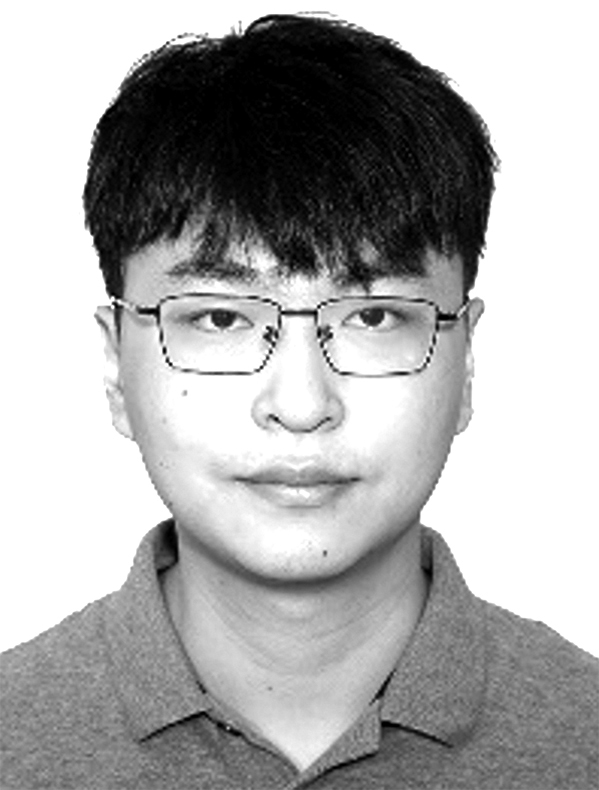 |  | 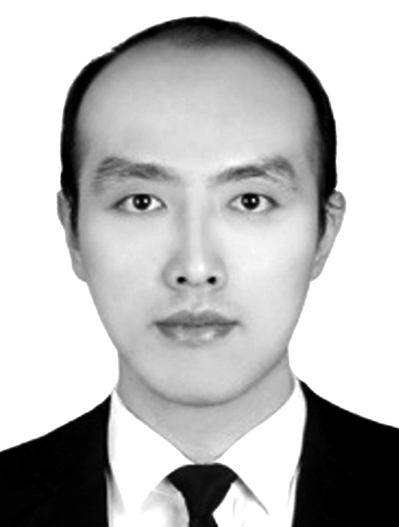 | 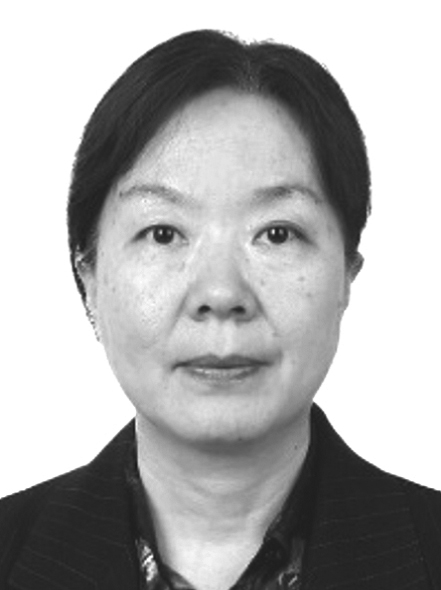 | 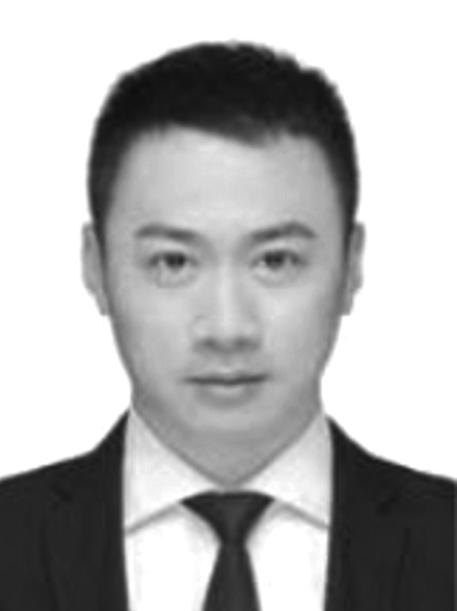 |  |
| Bijun Tang School of Automation, Beijing Institute of Technology | Kaoru Hirota School of Automation, Beijing Institute of Technology | Xiangdong Wu School of Automation, Beijing Institute of Technology | Yaping Dai School of Automation, Beijing Institute of Technology | Zhiyang Jia School of Automation, Beijing Institute of Technology |
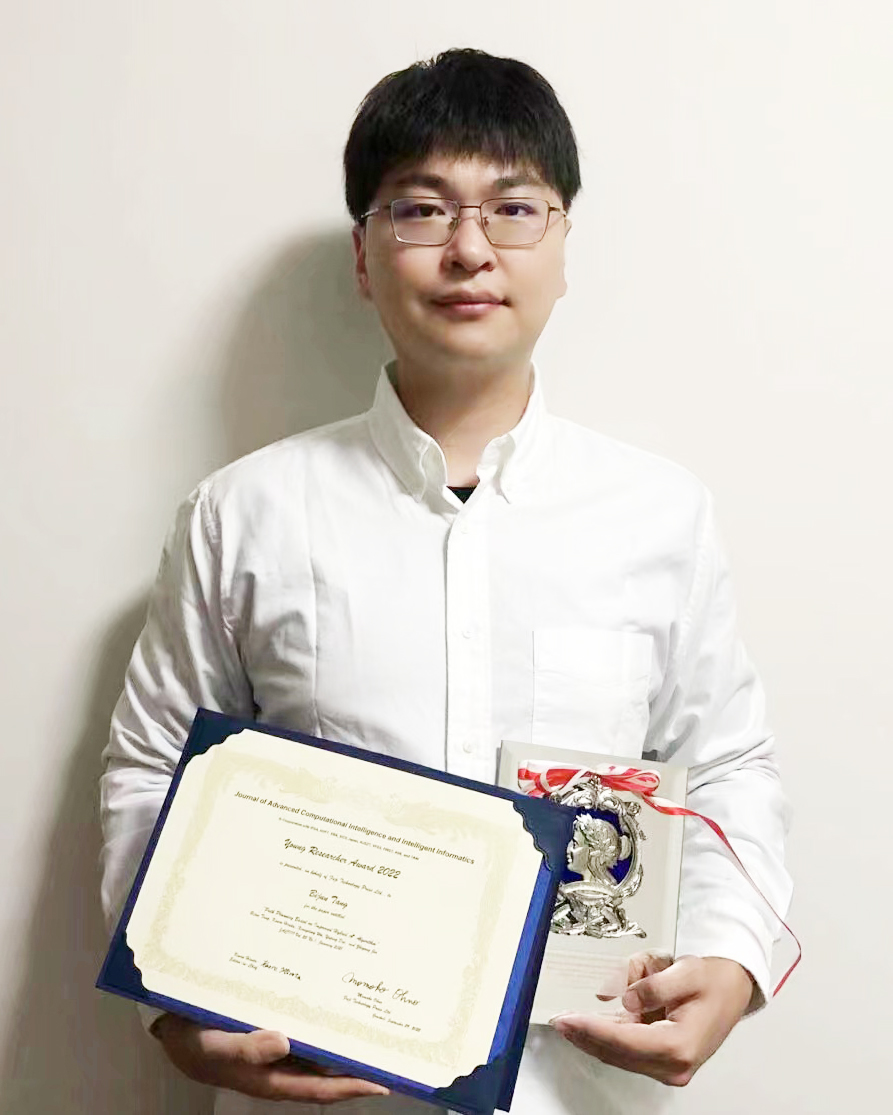
Fig. Mr. Bijun Tang holding a plaque and a certificate of the JACIII Young Researcher Award 2022.
Message from the Winner
Thank you to the JACIII editorial board for giving me the award. I am honored to receive it. This paper is thanks to the guidance of my teacher, Professor Hirota.
This paper, “Path Planning Based on Improved Hybrid A* Algorithm,” is a study of the Hybrid A* algorithm. In this paper, the artificial potential field (APF) concept is applied in order to optimize the paths generated by the Hybrid A* algorithm. The generated path not only satisfies the non-holonomic constraints of the vehicle but is also smooth, and it keeps a comfortable distance from the obstacle at the same time.
Once again, I would like to thank everyone who contributed to this paper and made it possible for me to receive this award. I hope the JACIII journal has more and more excellent papers in the future.
JACIII YOUNG RESEARCHER AWARD 2022 Recommendation System Based on Generative Adversarial Network with Graph Convolutional Layers Takato Sasagawa, Shin Kawai, and Hajime Nobuhara |
 | 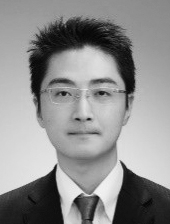 |  |  |
| Takato Sasagawa Department of Intelligent Interaction Technologies, Graduate School of Systems and Information Engineering, University of Tsukuba | Shin Kawai Department of Intelligent Interaction Technologies, Graduate School of Systems and Information Engineering, University of Tsukuba | Hajime Nobuhara Department of Intelligent Interaction Technologies, Graduate School of Systems and Information Engineering, University of Tsukuba |
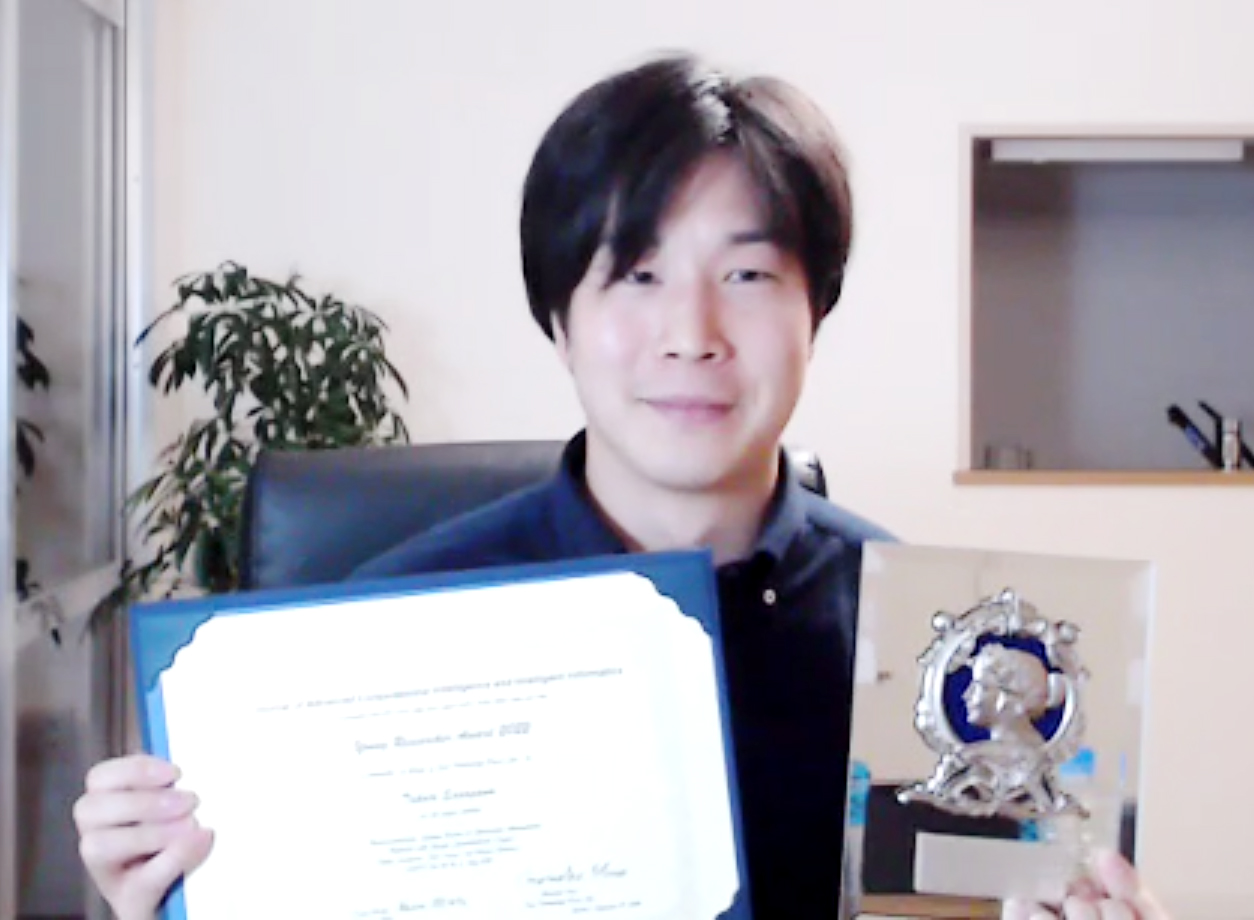
Fig. Mr. Takato Sasagawa holding a plaque and a certificate of the JACIII Young Researcher Award 2022.
Message from the Winner
I am truly honored to have been selected for the prestigious JACIII Young Researcher Award 2022. I sincerely appreciate the co-authors, the editorial office of JACIII, the reviewers, and the laboratory members.
It has been almost three years since 2019 when we worked on this paper related to recommendation algorithms. Companies such as YouTube, Amazon, and Netflix, which are also the background of our research, have increased in scale since that time, and content on the Internet continues to grow at a phenomenal pace.
In this context, the influence of recommendation algorithms is significant, and expectations for their performance improvement seem to be escalating day by day.
This research is to create recommendation data using a generative system that is based on graph convolution. Generative systems have already achieved remarkable success in pictures and photographs, and I believe their application fields will further expand.
We can also expect further developments in the field of recommendation systems. I am confident that our paper in the JACIII will contribute to the future development of this field.
Once again, it is a great pleasure for me to receive this prestigious award for our research, and I would like to express my deepest gratitude.
I believe this award and commendation will be a great encouragement to all students and researchers who are working on the recommendation algorithm.
I also wish for the development of the JACIII and the field of computational intelligence and intelligent informatics.
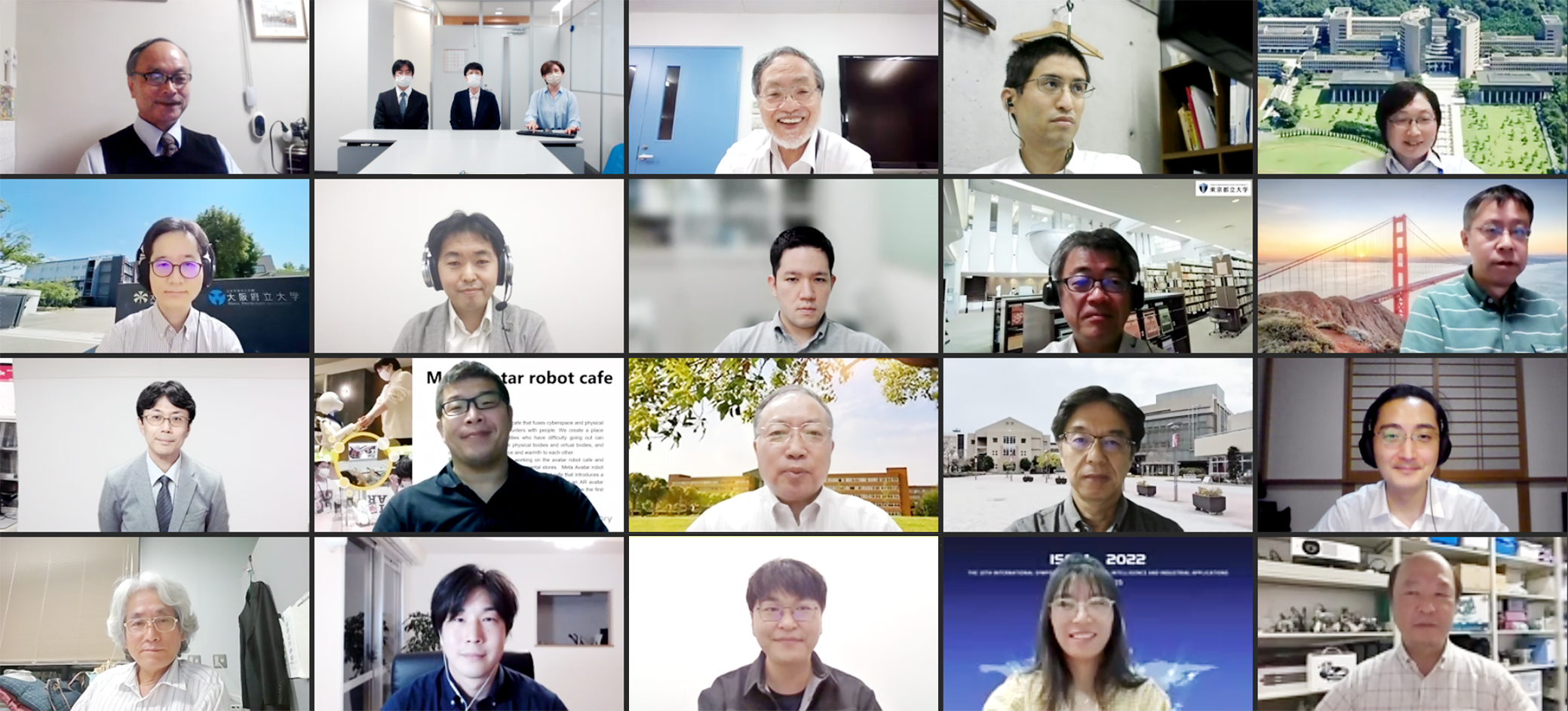
Fig. The winners of the Best Paper and Young Researcher Awards, editorial boards, and editorial staffs on the online ceremony. First row from left to right: Prof. Kaoru Hirota (Editor-in-Chief), editorial staffs, Prof. Toshio Fukuda (Editor-in-Chief), Dr. Hiroki Shibata, and Prof. Jinhua She. Second: Dr. Seiki Ubukata, Dr. Hajime Nobuhara, Dr. Kento Morita, Prof. Yasuhumi Takama, and Prof. Kazuteru Miyazaki. Third: Prof. Katsuhiro Honda (the BPA winner), Dr. Yoichi Yamazaki, Prof. Kewei Chen, Prof. Yoichiro Maeda, and Dr. Shin Kawai. Fourth: Prof. Keigo Watanabe, Mr. Takato Sasagawa (the YRA winner), Mr. Bijun Tang (the YRA winner), Ms. RongLi Li, and Prof. Isao Hayashi.
single-award.php
JACIII Best Paper and Young Researcher Awards 2021
JACIII BEST PAPER AWARD 2021 Self-Structured Cortical Learning Algorithm by Dynamically Adjusting Columns and Cells Sotetsu Suzugamine, Takeru Aoki, Keiki Takadama, and Hiroyuki Sato |
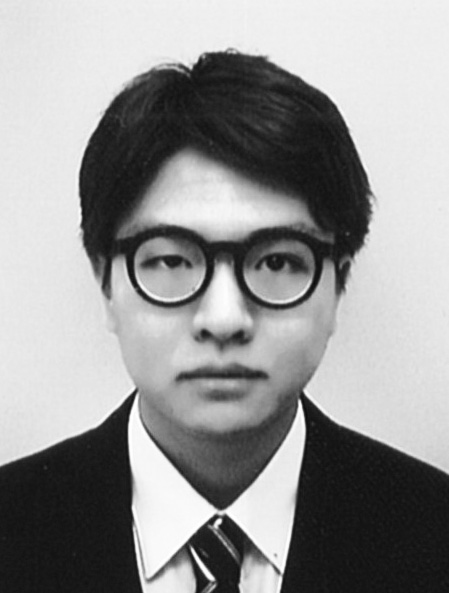 | 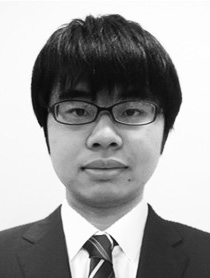 |  | 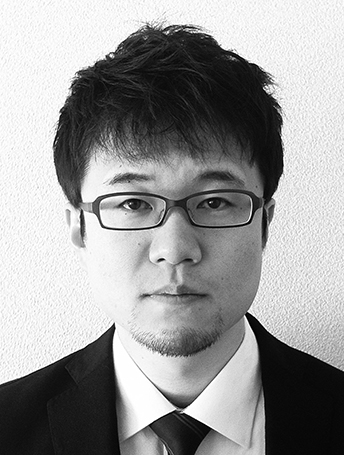 |  |
| Sotetsu Suzugamine Graduate School of Information and Engineering Sciences, The University of Electro-Communications | Takeru Aoki Graduate School of Information and Engineering Sciences, The University of Electro-Communications | Keiki Takadama Graduate School of Information and Engineering Sciences, The University of Electro-Communications | Hiroyuki Sato Graduate School of Information and Engineering Sciences, The University of Electro-Communications |
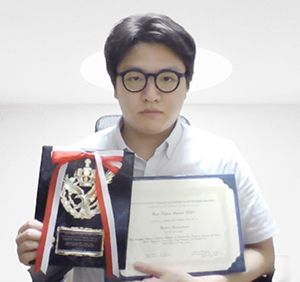
Fig. Mr. Sotetsu Suzugamine received a plaque and a certificate of the JACIII Best Paper Award 2021 on behalf of the authors.
Message from the Winner
I am very honored to receive the JACIII Best Paper Award 2021. I would like to express my sincere gratitude to the editorial board, reviewers, and everyone else who supported this study.
This paper, “Self-Structured Cortical Learning Algorithm by Dynamically Adjusting Columns and Cells,” is a study of the cortical learning algorithm (CLA). CLA is a time-series data prediction algorithm based on the human neocortex, the most important part of human intelligence. In this paper, we propose a method of dynamically increasing or decreasing self-structures, which are called columns and cells and which correspond to human neurons, to adjust them depending on the input data. The proposed method eliminates the need for column and cell parameters, which were previously determined statically. Furthermore, the experimental results on a multistep prediction of real-world power consumption show that the proposed self-structured CLA achieves high prediction accuracy.
Once again, I would like to express my gratitude to everyone involved in publishing this paper and making it possible for me to receive this award. I wish for the future development of scientific research in the field of computational intelligence and intelligent informatics.
JACIII YOUNG RESEARCHER AWARD 2021 Emotion Recognition Based on Multi-Composition Deep Forest and Transferred Convolutional Neural Network Xiaobo Liu, Xu Yin, Min Wang, Yaoming Cai, and Guang Qi |
 | 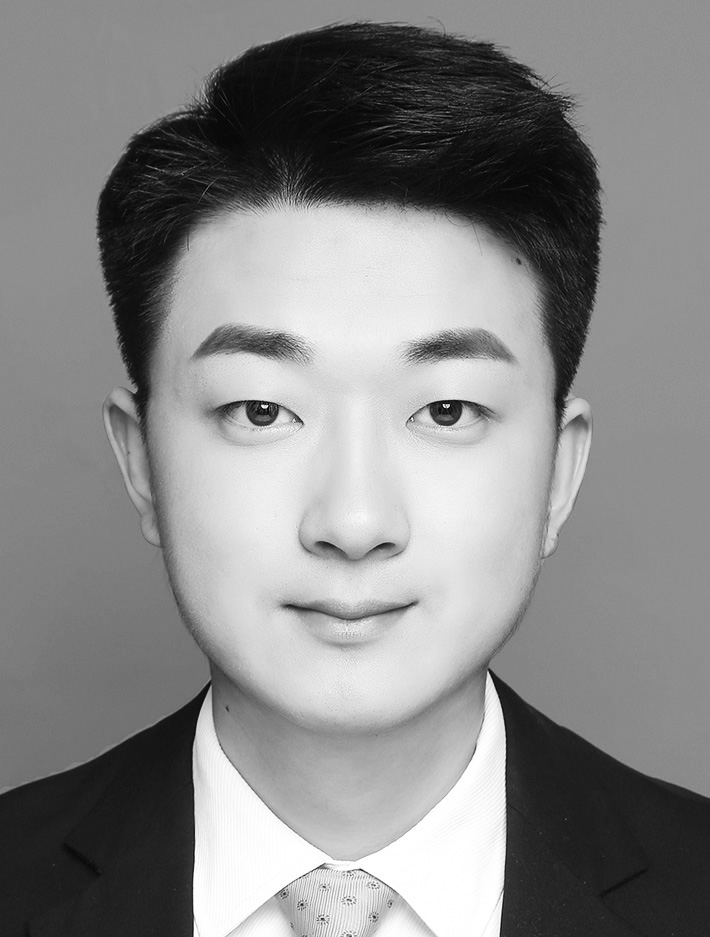 | 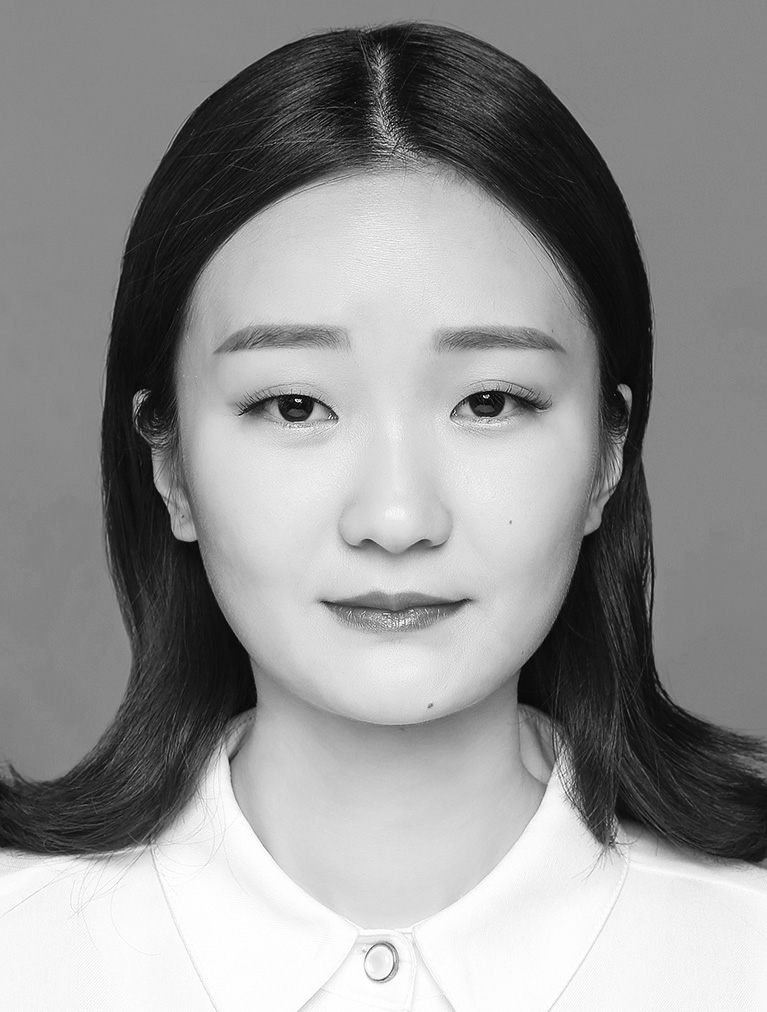 | 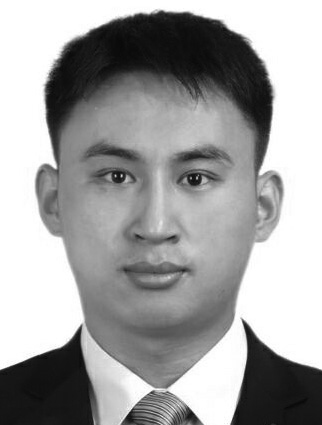 |  |  |
| Xiaobo Liu School of Automation, China University of Geosciences | Xu Yin School of Automation, China University of Geosciences | Min Wang School of Automation, China University of Geosciences | Yaoming Cai School of Computer Science, China University of Geosciences | Guang Qi School of Automation, China University of Geosciences |
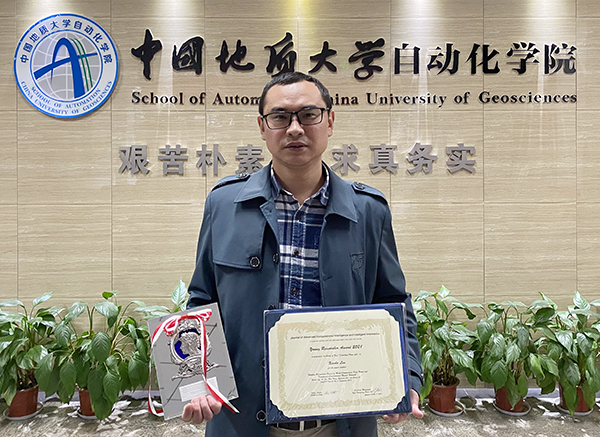
Fig. Dr. Xialbo Liu holding a plaque and a certificate of the JACIII Young Researcher Award 2021.
Message from the Winner
It is a great honor for me to receive the JACIII Young Researcher Award 2021. This award is the best form of praise for our work and will provide strong stimulation for our passion for research. We are deeply grateful to the JACIII editorial board/office, which made our paper easy to understand and gave it a beautiful layout. We are also grateful to the reviewers, who provided insightful comments that gave our paper more meaning and research value. Next, I wish to give my deepest thanks to my co-authors for their considerable contributions to emotion recognition based on multi-composition deep forest and transferred convolutional neural network. Our many discussions resulted in numerous rewrites, not to mention memories I will cherish forever.
We propose a novel emotion-recognition framework that uses a knowledge-transfer approach to capturing features, employing an improved, deep-forest model to determine the final emotions. The structure of a very deep, convolutional network is learned from ImageNet and is utilized to extract face and emotion features from other data sets, thereby solving the problem of insufficiently labeled samples. These features are then input into a classifier, “multi-composition deep forest,” which consists of 16 forests for facial emotion recognition, to enhance the diversity of the framework. The proposed method does not require that a network be trained with a complex structure, and the decision-tree-based classifier can achieve accurate results with very few parameters, making it easier to implement, train, and apply. Moreover, the classifier can adaptively decide the complexity of its model without iteratively updating parameters.
This truly interesting work is an indication of a new direction in facial emotion recognition. I hope that this paper promotes the development of both transfer learning and deep forest as well as related research, so that facial emotion recognition may find additional applications. The JACIII, the most popular journal of computational intelligence and intelligent informatics, is a powerful platform for sharing ideas and work, and I look forward to its continued improvement and success going forward.
JACIII YOUNG RESEARCHER AWARD 2021 Object-Oriented 3D Semantic Mapping Based on Instance Segmentation Jinxin Chi, Hao Wu, and Guohui Tian |
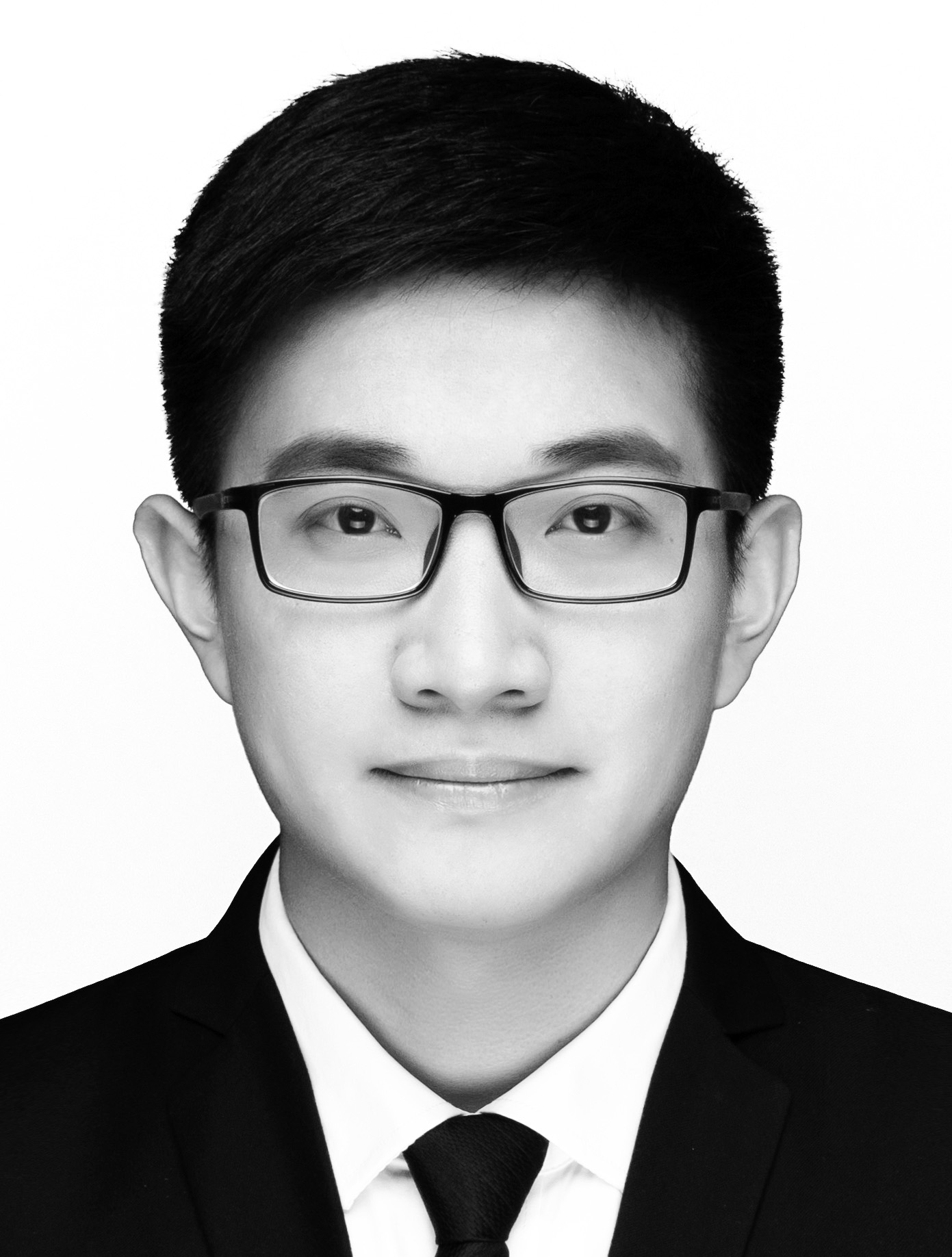 | 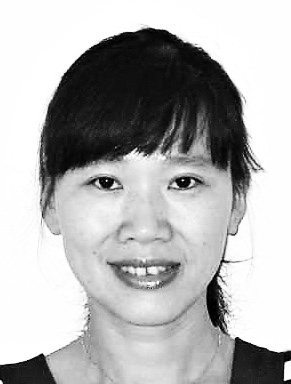 | 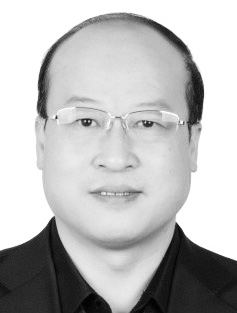 |  |
| Jinxin Chi School of Control Science and Engineering, Shandong University | Hao Wu School of Control Science and Engineering, Shandong University | Guohui Tian School of Control Science and Engineering, Shandong University |
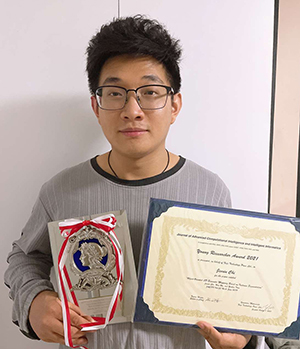
Fig. Mr. Jinxin Chi holding a plaque of the JACIII Young Researcher Award 2021.
Message from the Winner
I am very honored to receive the JACIII Young Researcher Award 2021. I am deeply grateful to the JACIII editorial office, reviewers, co-authors, and all supporters of this paper, “Object-Oriented 3D Semantic Mapping Based on Instance Segmentation.” This award is highly encouraging to my further study. My research interests include Visual SLAM and Robot Semantic Understanding. This paper proposes an object-oriented, 3D semantic mapping method that combines state-of-the-art, deep-learning-based Instance Segmentation and a Visual SLAM algorithm. The method helps robots not only gain navigation-oriented geometric information about the surrounding environment but also obtain individually-oriented attribute and location information about the objects. An object recognition and target association algorithm applied to continuous image frames is also proposed. The algorithm combines visual SLAM, which uses visual consistency between image frames to promote the results of object matching and recognition over continuous image frames, to improve the accuracy of object recognition. I hope that this study will contribute to the development of both Semantic Robot and Visual SLAM, and that Semantic Visual SLAM will be promoted and widely used in the future. I also wish for the development of the JACIII and the field of computational intelligence and intelligent informatics. Thank you.
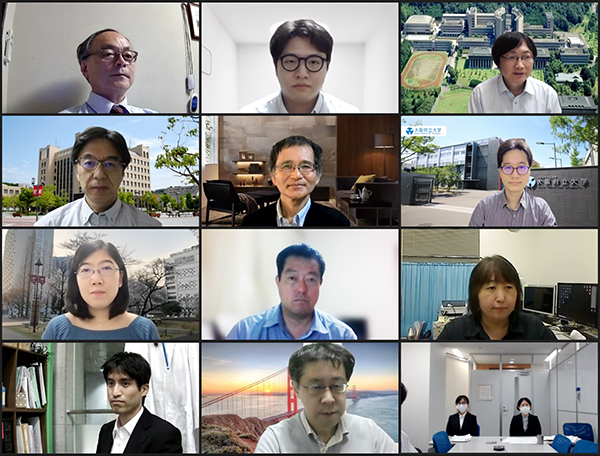
Fig. The winner of the Best Paper Award, editorial boards, and editorial staffs on the online ceremony. First row from left to right: Prof. Kaoru Hirota (Editor-in-Chief), Mr. Sotetsu Suzugamine (the BPA winner), and Prof. Jinhua She. Second: Prof. Yoichiro Maeda, Prof. Kiyohiko Uehara, and Dr. Seiki Ubukata. Third: Dr. Zhenni Pan, Prof. Tomohiro Yoshikawa, and Prof. Miho Ohsaki. Fourth: Dr. Hiroki Shibata, Prof. Kazuteru Miyazaki, and editorial staffs.
single-award.php
JACIII Best Paper and Young Researcher Awards 2020
JACIII BEST PAPER AWARD 2020 Crystalizing Effect of Simulated Annealing on Boltzmann Machine Hiroki Shibata, Hiroshi Ishikawa, and Yasufumi Takama |
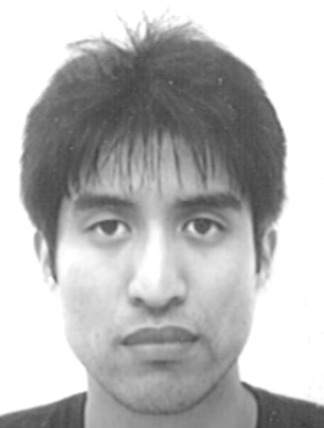 | 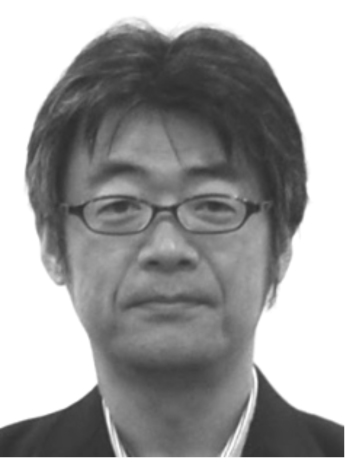 | 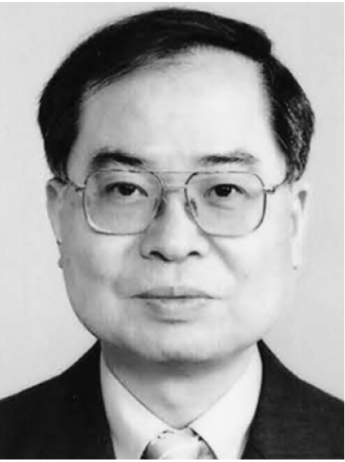 |
| Hiroki Shibata Graduate School of System Design, Tokyo Metropolitan University | Yasufumi Takama Graduate School of System Design, Tokyo Metropolitan University | Hiroshi Ishikawa Graduate School of System Design, Tokyo Metropolitan University |
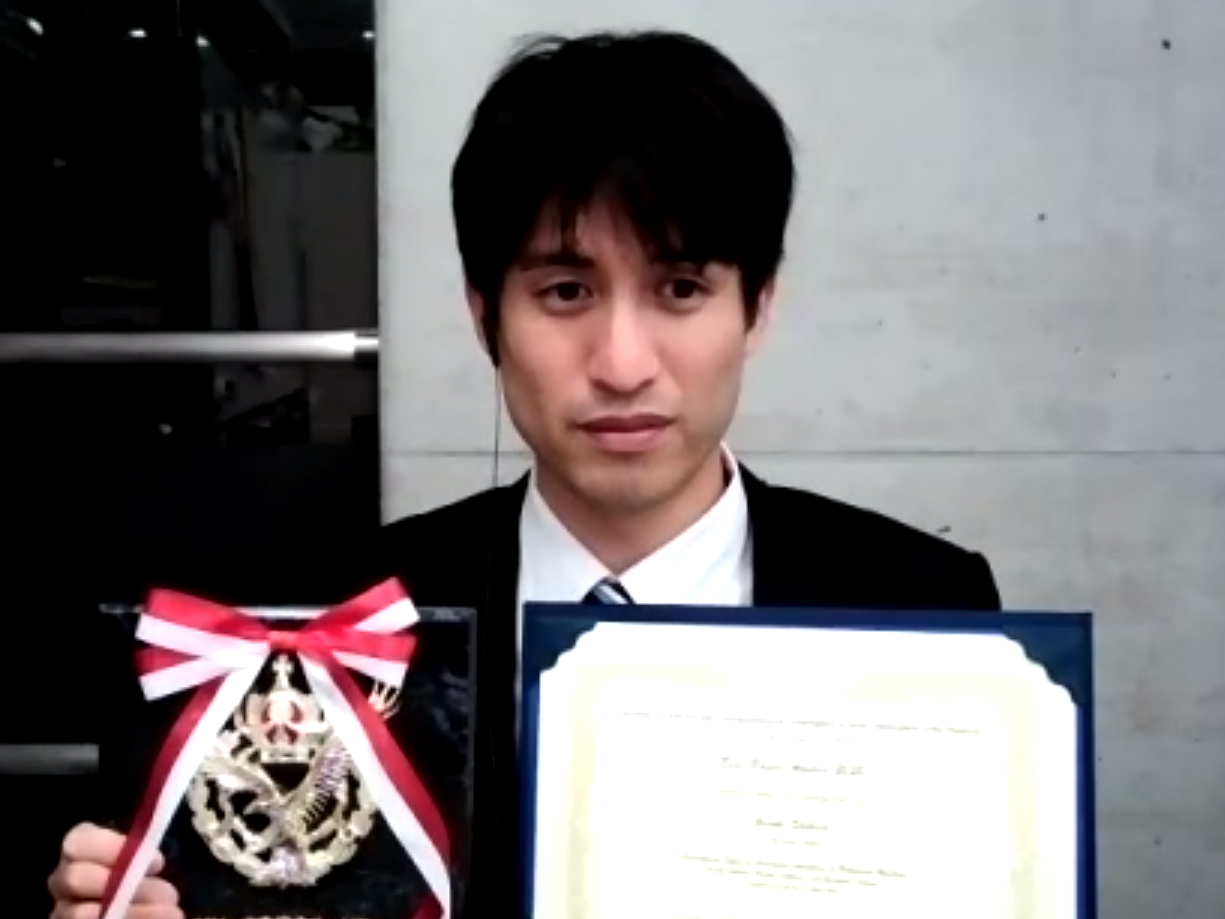
Fig. Dr. Hiroki Shibata received a plaque and a certificate of the JACIII Best Paper Award 2020 on behalf of the authors.
Message from the Winner
It is our honor to receive the JACIII’s Best Paper Award 2020, and we would sincerely like to thank the JACIII editorial office, reviewers, and all who supported this study. The work that received this honor was the “Crystalizing Effect of Simulated Annealing on Boltzmann Machine.” In this work, a method of obtaining an accurate estimate of the posterior distribution of a stacked Boltzmann machine (deep Boltzmann machine) is studied. It applies to simulated annealing the same analogy of the oating zone method that was employed to generate silicon crystals in material science and engineering. Additionally, we investigated the reason behind its capacity for high accuracy, concluding that it comes from the restricting effect of information flow of simulated annealing with non-uniform temperature distribution. Again, we would like to express our appreciation to the JACIII for giving us a chance to publish this work. We hope the results contained in the paper will encourage future scientic work. We will continue to carry out investigations based on these results, further contributing to humanity.
JACIII YOUNG RESEARCHER AWARD 2020 Swimming Style Classification Based on Ensemble Learning and Adaptive Feature Value by Using Inertial Measurement Unit Yuto Omae, Yoshihisa Kon, Masahiro Kobayashi, Kazuki Sakai, Akira Shionoya, Hirotaka Takahashi, Takuma Akiduki, Kazufumi Nakai, Nobuo Ezaki, Yoshihisa Sakurai, and Chikara Miyaji |
 |  |  |  |  |  |
| Yuto Omae Department of Industrial Engineering and Management, College of Industrial Technology, Nihon University | Yoshihisa Kon Department of Information and Management Systems Engineering, Nagaoka University of Technology | Masahiro Kobayashi Department of Information and Management Systems Engineering, Nagaoka University of Technology | Kazuki Sakai Department of Information Science and Control Engineering, Nagaoka University of Technology | Akira Shionoya Department of Information and Management Systems Engineering, Nagaoka University of Technology |
 |  |  |  |  |  |
| Hirotaka Takahashi Department of Information and Management Systems Engineering, Nagaoka University of Technology | Takuma Akiduki Toyohashi University of Technology | Kazufumi Nakai National Institute of Technology, Toba College | Nobuo Ezaki National Institute of Technology, Toba College | Yoshihisa Sakurai Sports Sensing Co., LTD. | Chikara Miyaji Department of Creative Informatics, The University of Tokyo |
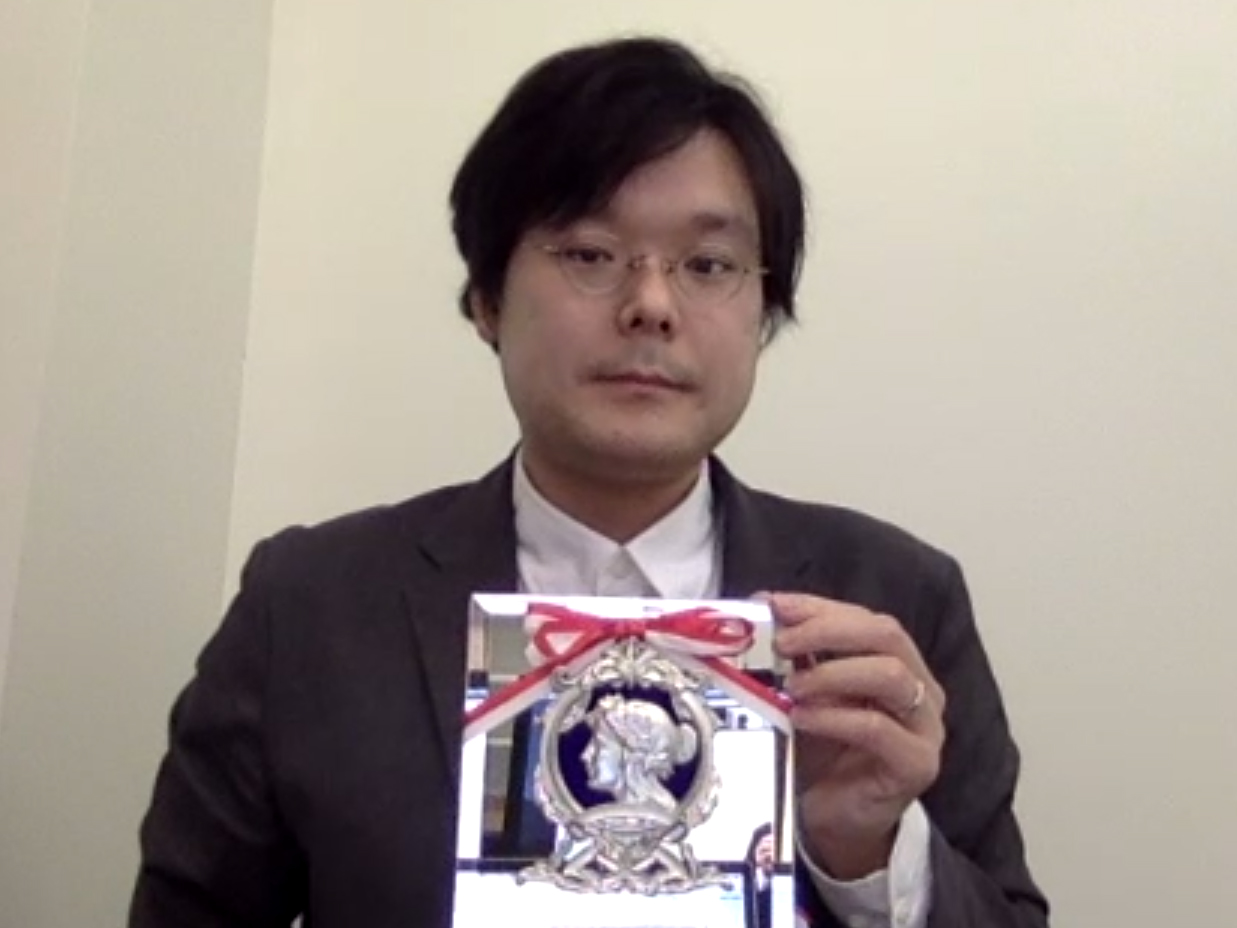
Fig. Dr. Yuto Omae holding a plaque of the JACIII Young Researcher Award 2020.
Message from the Winner
I am honored to receive the JACIII Young Researcher Award 2020 and grateful to the JACIII editorial board/office, reviewers, and co-authors of our paper. In this paper, I present a method of classifying swimming styles that is based on Random Forest and Out-of-Bag features selection and uses a single inertial sensor attached to a swimmer. I also develop a support system for swimmers. I hope that our system helps many swimmers to improve their performance. If the paper interests you, please read it. Beside this, I am interested in using adaptive data analysis methods, including machine learning and artificial intelligence, on various kinds of data, such as signals, images, and natural languages.
I have been an Assistant Professor in the Department of Industrial Engineering and Management, College of Industrial Technology, Nihon University, Japan since April 2019. Because there are many students interested in soft computing at this institute, I teach them various soft computing methods. I hope that my activities and research help to make for a better society. I also hope for the continued development of soft computing.
JACIII YOUNG RESEARCHER AWARD 2020 Approach to Clustering with Variance-Based XCS Caili Zhang, Takato Tatsumi, Masaya Nakata, and Keiki Takadama |
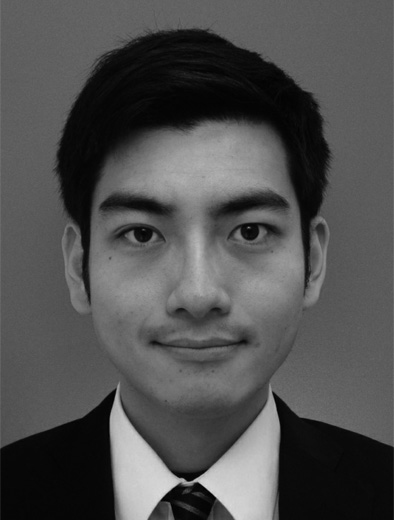 | 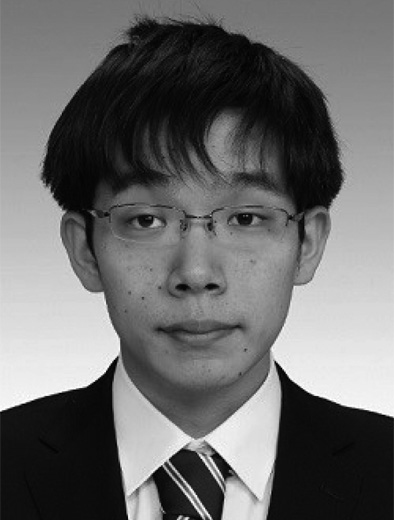 | 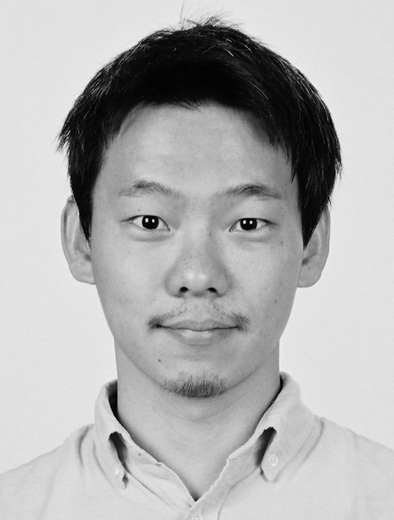 | 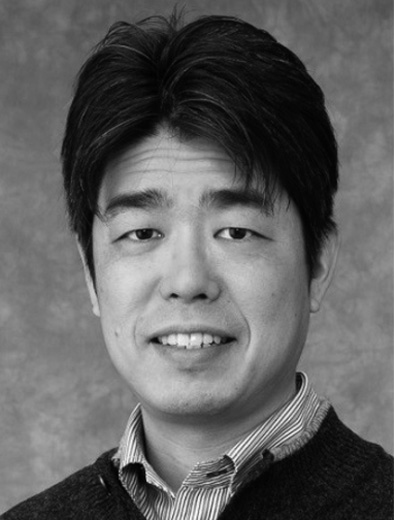 |
| Caili Zhang The University of Electro-Communications | Takato Tatsumi The University of Electro-Communications | Masaya Nakata The University of Electro-Communications | Keiki Takadama The University of Electro-Communications |
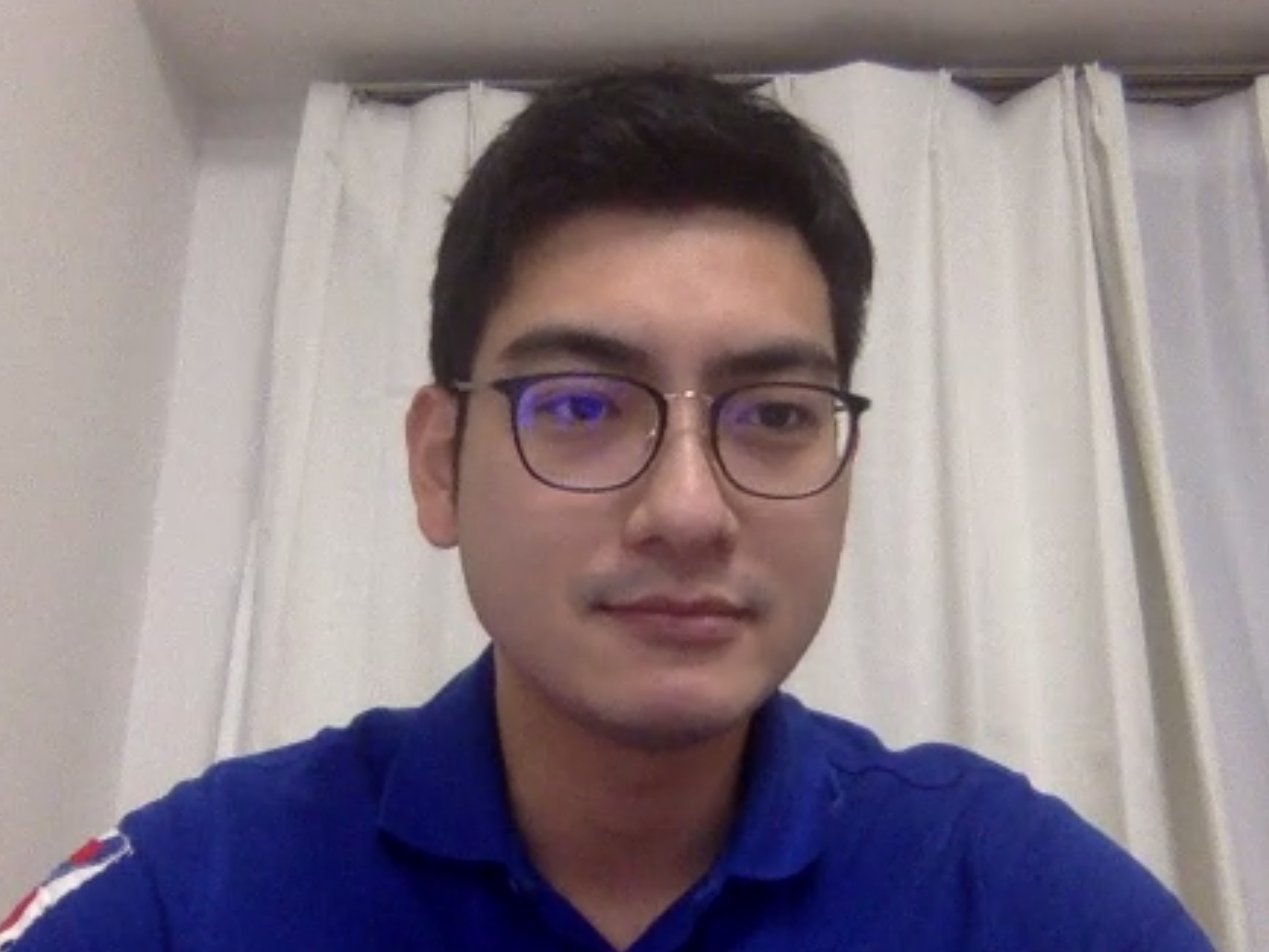
Fig. Mr. Caili Zhang took time out from his busy schedule to participate in the ceremony.
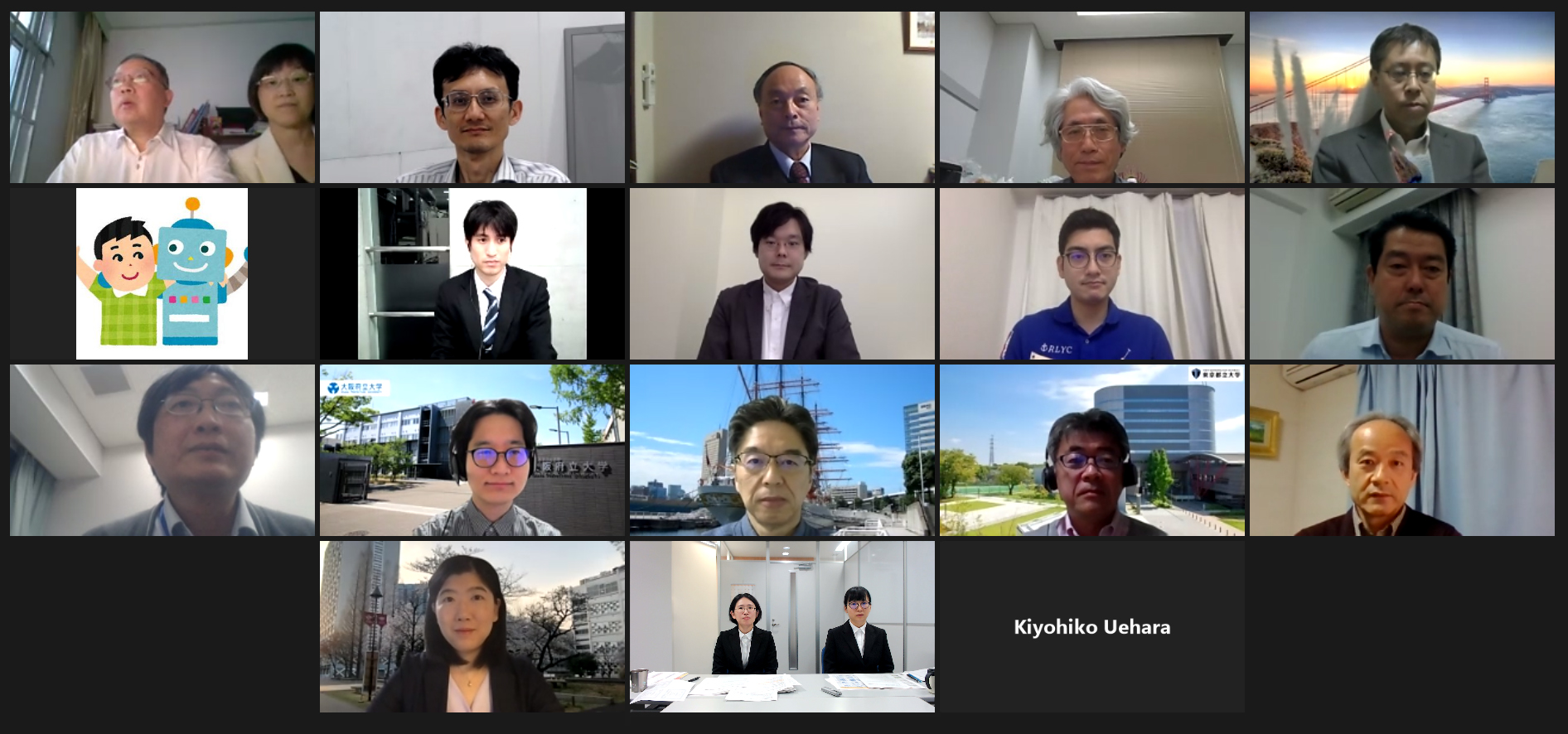
Fig. The award ceremony was held online in order to prevent spreading of COVID-19. Winners, editorial boards, and editorial staffs on the online ceremony. First row from left to right: Prof. Kewei Chen and Prof. Fangyan Dong, Prof. Syoji Kobashi, Prof. Kaoru Hirota (Editor-in-Chief), Prof. Keigo Watanabe, and Prof. Kazuteru Miyazaki. Second: Prof. Tomomi Hashimoto (image), Dr. Hiroki Shibata (the BPA winner), Dr. Yuto Omae (the YRA winner), Mr. Caili Zhang (the YRA winner), and Prof. Tomohiro Yoshikawa. Third: Prof. Jinhua She, Dr. Seiki Ubukata, Prof. Yoichiro Maeda, Prof. Yasufumi Takama, and Prof. Masafumi Hagiwara. Fourth: Dr. Zhenni Pan, editorial staffs, and Prof. Kiyohiko Uehara (image).
single-award.php
JACIII Best Paper, Young Researcher, and Best Review Paper Awards 2019
JACIII BEST PAPER AWARD 2019 Analyzing Potential of Personal Values-Based User Modeling for Long Tail Item Recommendation Yasufumi Takama, Yu-Sheng Chen, Ryori Misawa, and Hiroshi Ishikawa |
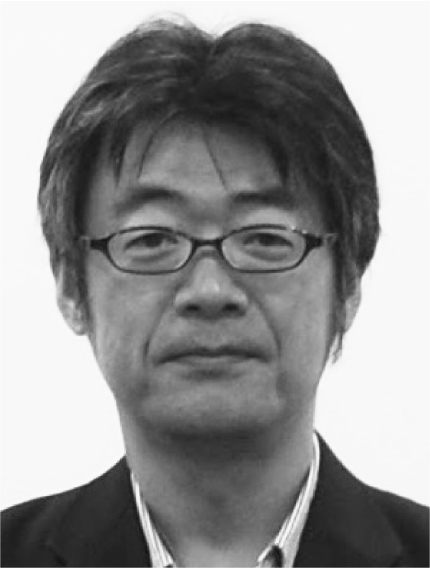 | 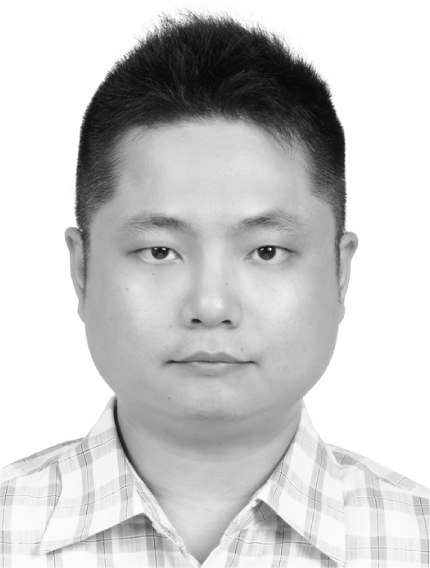 | 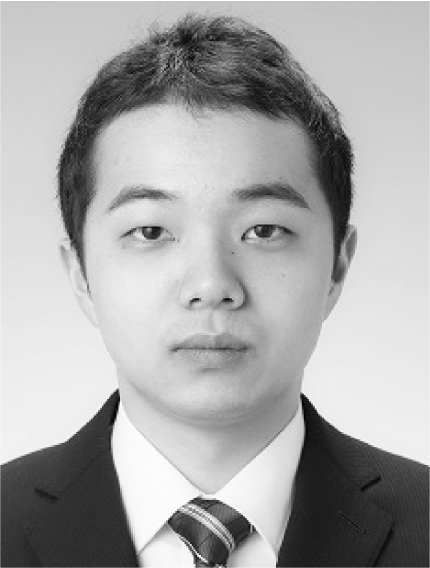 | 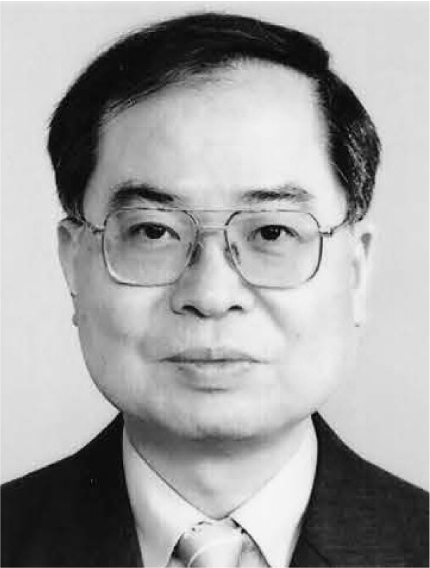 |
| Yasufumi Takama Graduate School of System Design, Tokyo Metropolitan University | Yu-Sheng Chen Graduate School of System Design, Tokyo Metropolitan University | Ryori Misawa Graduate School of System Design, Tokyo Metropolitan University | Hiroshi Ishikawa Graduate School of System Design, Tokyo Metropolitan University |
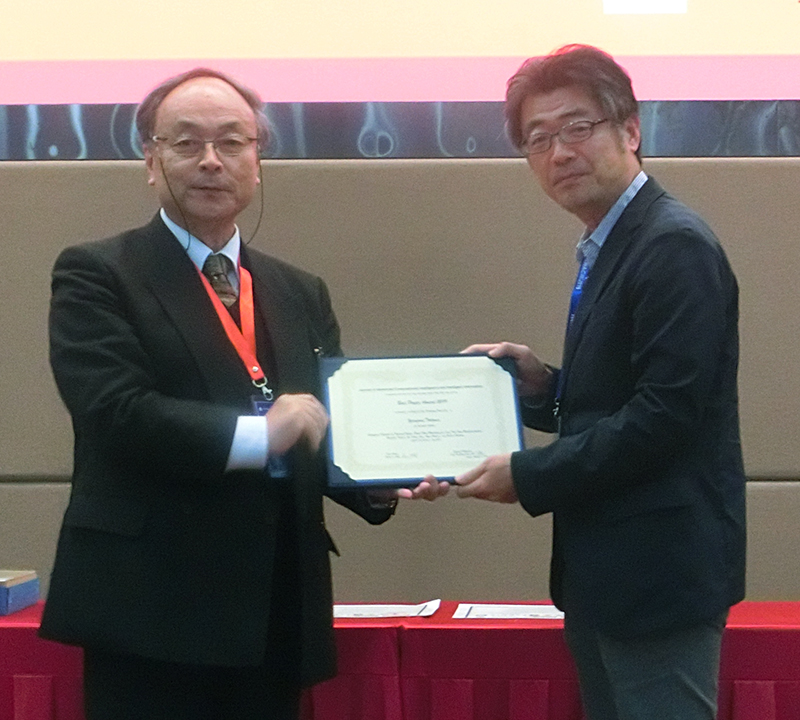
Fig. From Prof. Kaoru Hirota, the JACIII Editor-in-Chief, Prof. Yasufumi Takama received a certificate of the JACIII Best Paper Award 2019 on behalf of the authors.
Message from the Winner
We are very honored to receive the JACIII’s Best Paper Award 2019. We would like to thank the award committee for this great honor. We have proposed a user modeling method based on personal values. The method is called Rating Matching Rate (RMRate), which was reported in our previous publication on the JACIII. Using RMRate, personal values are modeled as the effect of an item’s attributes on a user’s rating. Assuming that the personal values strongly affect our evaluation of unpopular items, this paper examines its effectiveness for long tail item recommendation. The proposed long tail item recommendation consists of RMRate, user-based collaborative filtering, and a strategy for selecting long tail items. The experimental results show incorporating personal values enables the recommendation of long tail items while maintaining recommendation accuracy. As introducing personal values into recommender systems is a relatively new idea, we decided to submit our papers related to RMRate to the JACIII, which encourages the submission of reports on pioneering studies. We would like to submit our papers to the JACIII to report on subsequent studies in the future.
JACIII YOUNG RESEARCHER AWARD 2019 Characteristics of Rough Set C-Means Clustering Seiki Ubukata, Keisuke Umado, Akira Notsu, and Katsuhiro Honda |
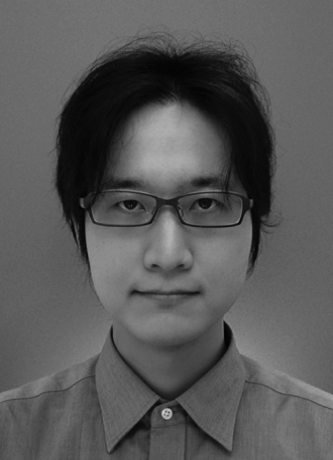 | 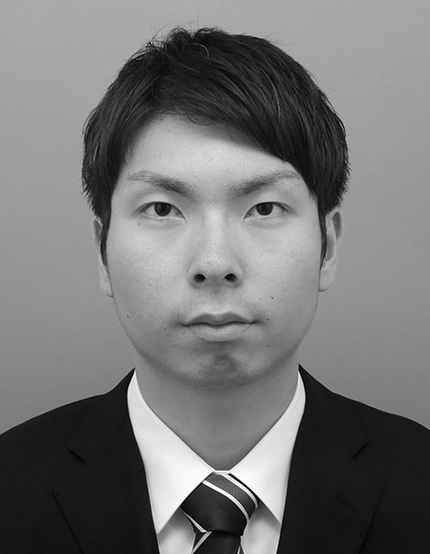 | 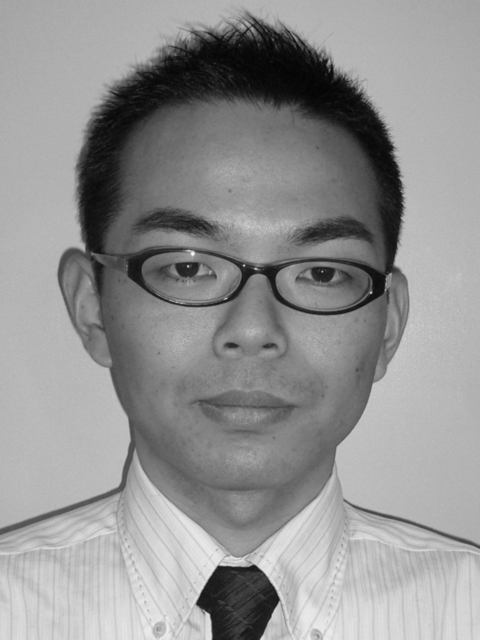 | 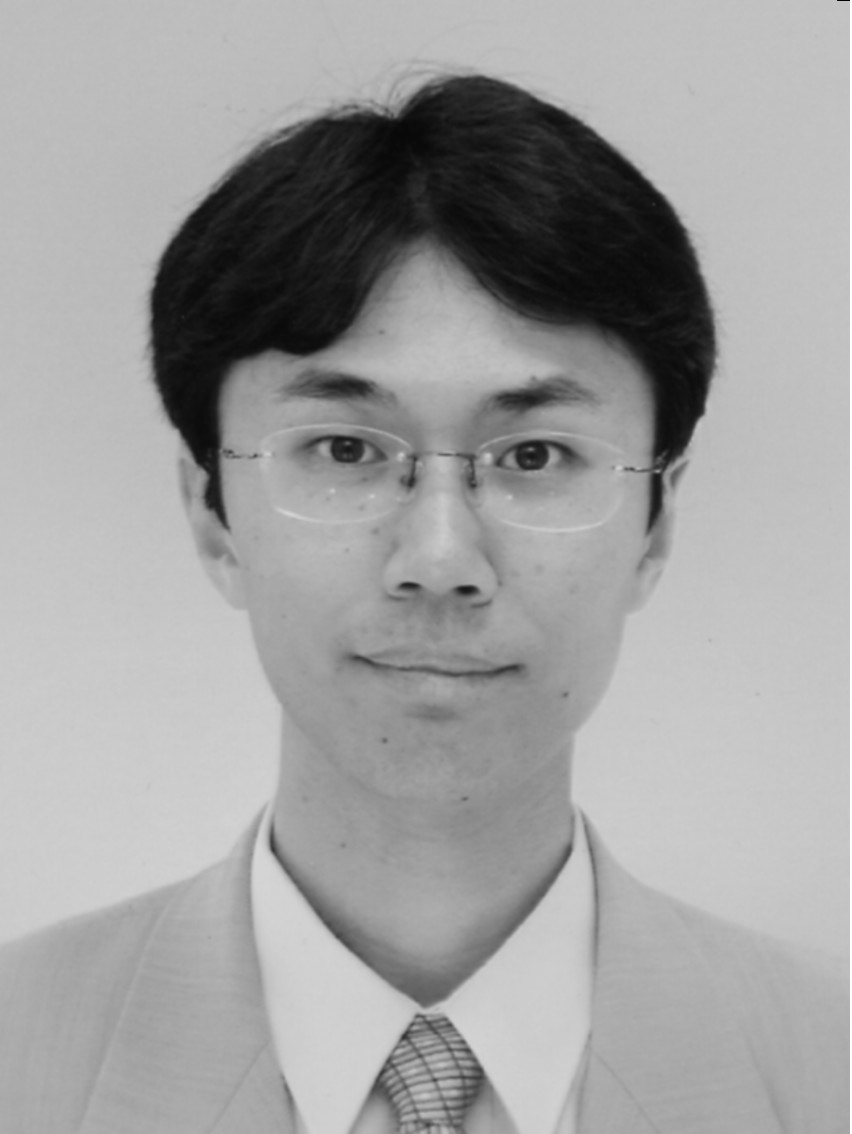 |
| Seiki Ubukata Osaka Prefecture University | Keisuke Umado Osaka Prefecture University | Akira Notsu Osaka Prefecture University | Katsuhiro Honda Osaka Prefecture University |
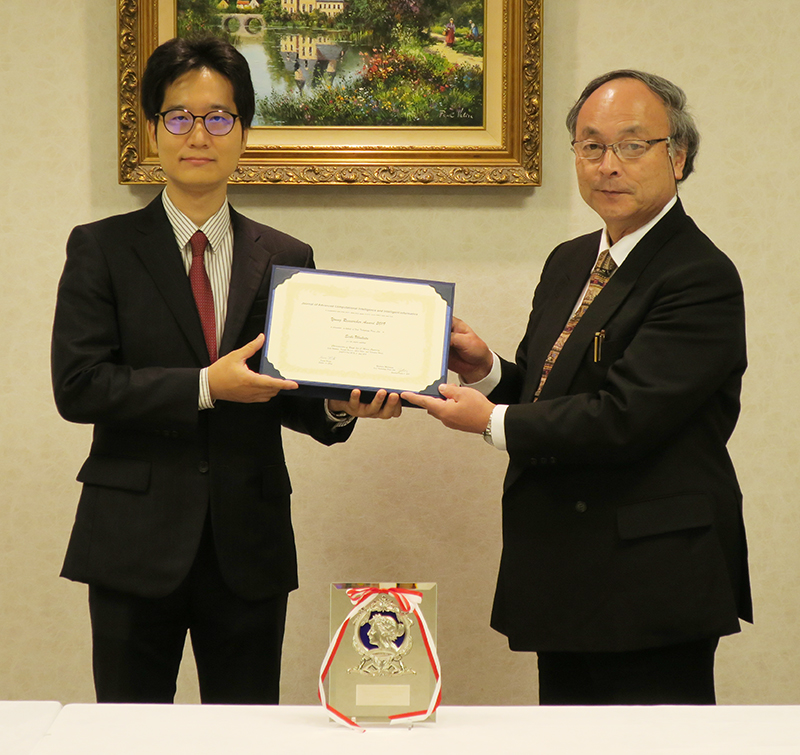
Fig. Dr. Seiki Ubukata received a certificate and a plaque of the JACIII Young Researcher Award 2019.
Message from the Winner
I am very honored to receive this prestigious award, the “JACIII Young Researcher Award 2019.” I am deeply grateful to the JACIII editorial board/office, reviewers, co-authors, and all supporters of this paper, “Characteristics of Rough Set C-Means Clustering.” This award is highly encouraging to my further study. My research interests include cluster analysis (clustering) and soft computing, especially rough set theory. This paper introduces the perspective of rough set theory to hard C-means (HCM; k-means) clustering to deal with uncertainty. The proposed method, rough set C-means (RSCM), is a clustering model based on the object space granulated by a binary relation. RSCM uses the rough set to approximate each temporal cluster and considers whether it is positive, possible, or uncertain that an object belongs to each cluster. While fuzzy clustering has been well studied and widely used, rough set-based clustering has not been well studied, leaving room for further investigation. Since cluster structures in the real-world dataset are not always clear, the handling of uncertainty based on rough sets is a very important and interesting subject. I hope that this study will contribute to the development of both clustering and rough set theory, and that rough set-based clustering will be promoted and widely used in the future. I also wish for the development of JACIII and the field of computational intelligence and intelligent informatics. Thank you.
JACIII BEST REVIEW PAPER AWARD 2019 A Survey of Video-Based Crowd Anomaly Detection in Dense Scenes Junjie Ma, Yaping Dai, and Kaoru Hirota |
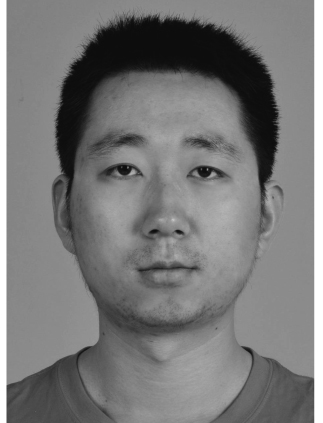 | 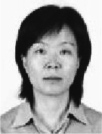 |  |
| Junjie Ma School of Automation, Beijing Institute of Technology | Yaping Dai School of Automation, Beijing Institute of Technology | Kaoru Hirota School of Automation, Beijing Institute of Technology |
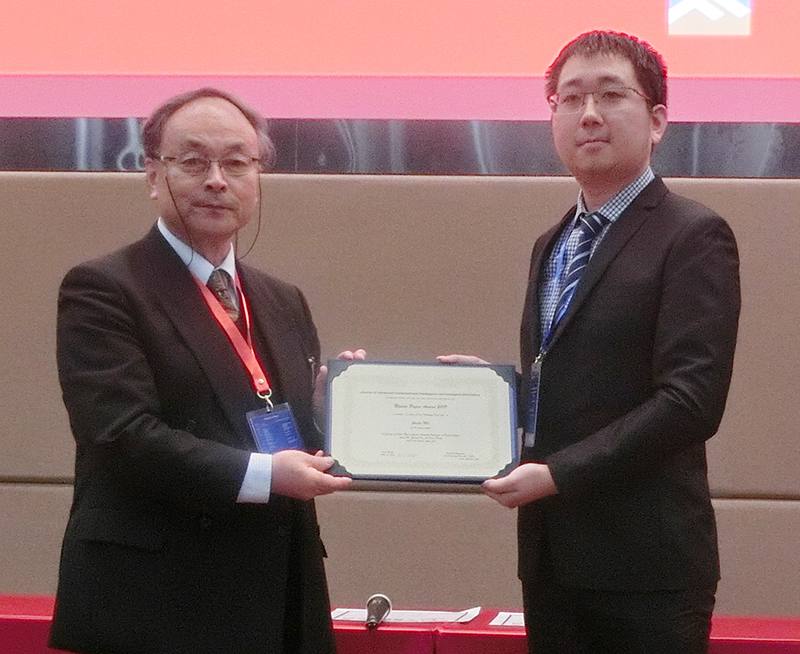
Fig. Mr. Junjie Ma received a certificate of the JACIII Review Paper Award 2019 on behalf of the authors.
Message from the Winner
I would like to thank the award committee of the JACIII of Fuji Technology Press for granting me this award. It is a great honor and an affirmation of my current academic level.
I am now a Ph.D. candidate at the Beijing Institute of Technology, China. When my supervisor, Professor Yaping Dai, notified me by email that my paper had been selected to win the JACIII Best Review Paper Award, I was amazed and excited. As this is my first time to win a best paper award issued by a famous international journal, I would also like to share my happiness with my labmates, friends, and family members.
This paper was written with the help of Professors Yaping Dai and Kaoru Hirota. I would like to thank them for enhancing the quality of the paper, modifying the English in it, and providing meaningful academic advice in general. The main purpose of this paper was to survey recent prominent works on crowd counting and anomaly detection based on the analysis of pedestrians. These two tasks are significant research areas that have been gathering attention in the fields of intelligent surveillance systems and public security. In fact, by the end of 2019, top computer vision conferences such as CVPR and ICCV will have published more than 20 papers on crowd counting alone. I hope that this paper can provide some meaningful basic knowledge to those who are interested and would like to learn more about crowd counting and anomaly detection.
I continue to do research on the task of crowd counting and have already finished some additional works. I would very much appreciate the opportunity to discuss related issues with experts in this field and to collaborate, if possible.
single-award.php
JACIII Best Paper and Young Researcher Awards 2018
JACIII BEST PAPER AWARD 2018 Bloch Sphere-Based Representation for Quantum Emotion Space Fei Yan, Abdullah M. Iliyasu, Zhen-Tao Liu, Ahmed S. Salama, Fangyan Dong, and Kaoru Hirota |
 |  |  |  |  |  |
| Fei Yan School of Computer Science and Technology, Changchun University of Science and Technology, Department of Computational Intelligence and Systems Science, Tokyo Institute of Technology | Abdullah M. Iliyasu Department of Computational Intelligence and Systems Science, Tokyo Institute of Technology, College of Engineering, Salman Bin Abdulaziz University | Zhen-Tao Liu School of Automation, China University of Geosciences | Ahmed S. Salama College of Engineering, Salman Bin Abdulaziz University | Fangyan Dong Department of Computational Intelligence and Systems Science, Tokyo Institute of Technology | Kaoru Hirota Department of Computational Intelligence and Systems Science, Tokyo Institute of Technology |
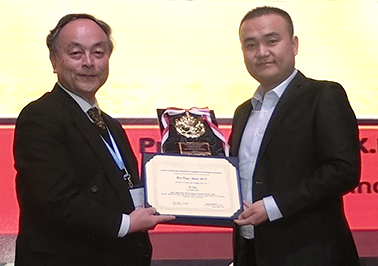
Fig. From Prof. Kaoru Hirota (left), JACIII Editor-in-Chief, Prof. Fei Yan received a plaque and a certificate of the JACIII Best Paper Award 2018 on behalf of the authors at ISCIIA&ITCA2018, Nov. 4, Shandong, China.
JACIII YOUNG RESEARCHER AWARD 2018 XCSR Learning from Compressed Data Acquired by Deep Neural Network Kazuma Matsumoto, Takato Tatsumi, Hiroyuki Sato, Tim Kovacs, and Keiki Takadama |
 |  |  |  |  |
| Kazuma Matsumoto The University of Electro-Communications | Takato Tatsumi The University of Electro-Communications | Hiroyuki Sato The University of Electro-Communications | Tim Kovacs The University of Bristol | Keiki Takadama The University of Electro-Communications |
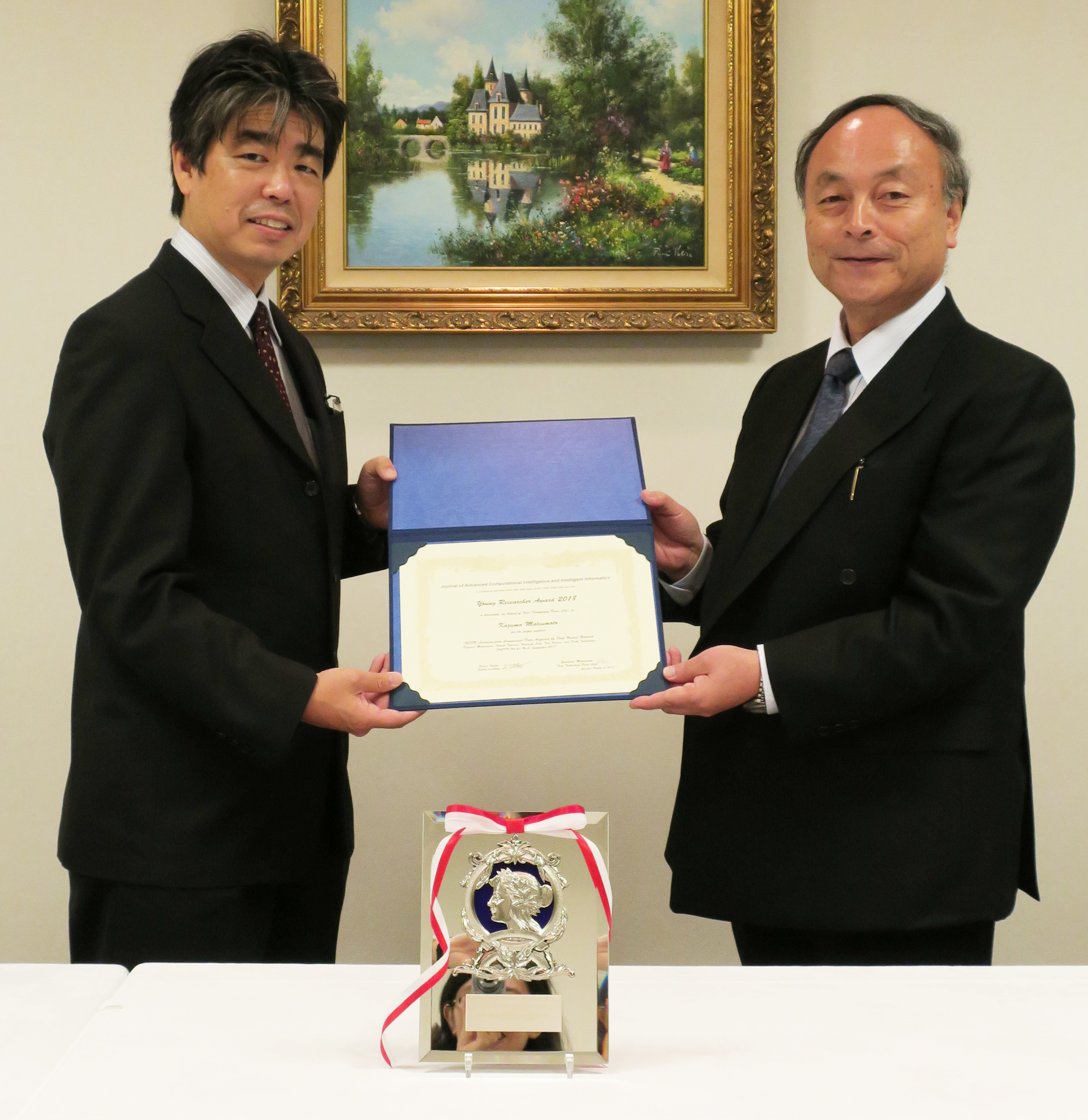
Fig. Prof. Keiki Takadama received a certificate and a plaque of the JACIII Young Researcher Award 2018 on behalf of Mr. Kazuma Matsumoto.
single-award.php
JACIII Best Paper and Young Researcher Awards 2017
JACIII BEST PAPER AWARD 2017 Multi-Robot Behavior Adaptation to Humans’ Intention in Human-Robot Interaction Using Information-Driven Fuzzy Friend-Q Learning Lue-Feng Chen, Zhen-Tao Liu, Min Wu, Fangyan Dong, and Kaoru Hirota |
 |  |  |  |  |
| Lue-Feng Chen Department of Computational Intelligence and Systems Science, Tokyo Institute of Technology | Zhen-Tao Liu School of Automation, China University of Geosciences | Min Wu School of Automation, China University of Geosciences | Fangyan Dong Department of Computational Intelligence and Systems Science, Tokyo Institute of Technology | Kaoru Hirota Department of Computational Intelligence and Systems Science, Tokyo Institute of Technology |
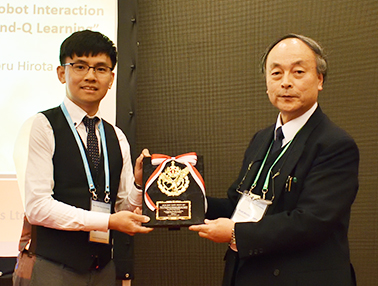
Fig. From Prof. Kaoru Hirota (right), JACIII Editor-in-Chief, Dr. Lue-Feng Chen received a plaque of the JACIII Best Paper Award 2017 on behalf of the authors.
JACIII YOUNG RESEARCHER AWARD 2017 AEGA: A New Real-Coded Genetic AlgorithmTaking Account of Extrapolation Kento Uemura and Isao Ono |
 |  |
| Kento Uemura Interdisciplinary Graduate School of Science and Engineering, Tokyo Institute of Technology | Isao Ono Interdisciplinary Graduate School of Science and Engineering, Tokyo Institute of Technology |
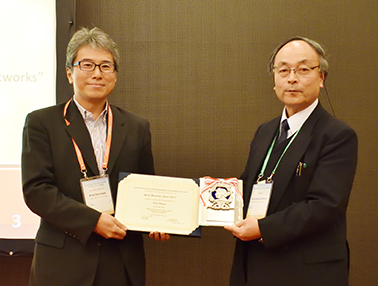
Fig. Prof. Isao Ono received a certificate and a plaque of the JACIII Young Researcher Award 2017 on behalf of Mr. Kento Uemura.
JACIII YOUNG RESEARCHER AWARD 2017 An Improved Particle Swarm Optimization Deployment for Wireless Sensor Networks Shuxin Ding, Chen Chen, Jie Chen, and Bin Xin |
 |  |  |  |
| Shuxin Ding School of Automation, Beijing Institute of Technology, Key Laboratory of Intelligent Control and Decision of Complex Systems | Chen Chen School of Automation, Beijing Institute of Technology, Key Laboratory of Intelligent Control and Decision of Complex Systems | Jie Chen School of Automation, Beijing Institute of Technology, Key Laboratory of Intelligent Control and Decision of Complex Systems | Bin Xin School of Automation, Beijing Institute of Technology, Key Laboratory of Intelligent Control and Decision of Complex Systems |
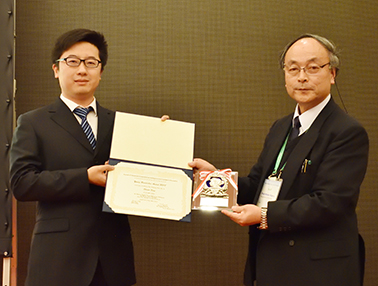
Fig. Dr. Shuxin Ding, the awardee of the JACIII Young Researcher Award 2017, received a certificate and a plaque. Award ceremony took place at IWACIII2017, Nov. 4, Beijing, China.
single-award.php
JACIII Best Paper and Young Researcher Awards 2016
JACIII BEST PAPER AWARD 2016 Discovering Emotion-Inducing Music Features Using EEG Signals Rafael Cabredo, Roberto Legaspi, Paul Salvador Inventado, and Masayuki Numao |
 |  |  |  |
| Rafael Cabredo College of Computer Studies, De La Salle University, Manila | Roberto Legaspi The Institute of Scientific and Industrial Research, Osaka University | Paul Salvador Inventado The Institute of Scientific and Industrial Research (ISIR), Osaka University | Masayuki Numao The Institute of Scientific and Industrial Research, Osaka University |
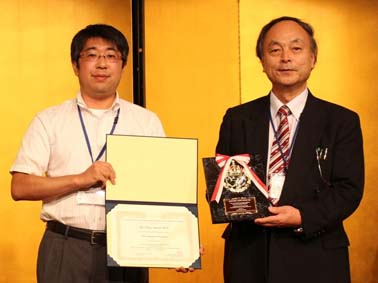
Fig. From Prof. Kaoru Hirota (right), JACIII Editor-in-Chief, Prof. Kenichi Fukui received the certificates and a plaque of the JACIII Best Paper Award 2016 on behalf of the authors.
JACIII YOUNG RESEARCHER AWARD 2016 Fuzzy Inference Based Vehicle to Vehicle Network Connectivity Model to Support Optimization Routing Protocol for Vehicular Ad-Hoc Network (VANET) Chehung Lin, Fangyan Dong, and Kaoru Hirota |
 | 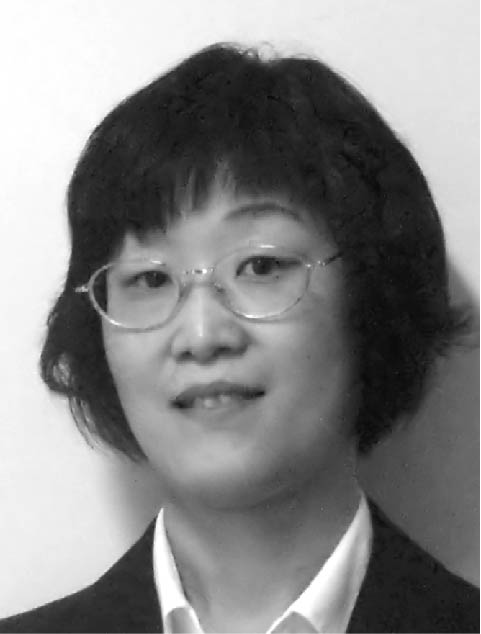 |  |
| Chehung Lin Tokyo Institute of Technology | Fangyan Dong Tokyo Institute of Technology | Kaoru Hirota Tokyo Institute of Technology |
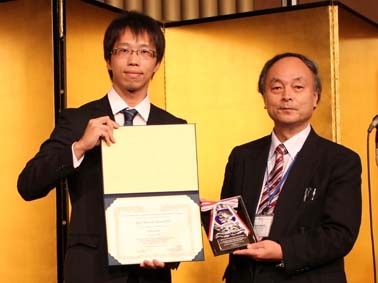
Fig. Dr. Chehung Lin, the awardee of the JACIII Young Researcher Award 2016, received a certificate and a plaque. Award ceremony took place at SCIS&ISIS2016, Aug. 27, Sapporo, Japan.
single-award.php
JACIII Best Paper and Young Researcher Awards 2015
JACIII BEST PAPER AWARD 2015 Landmark FN-DBSCAN: An Efficient Density-Based Clustering Algorithm with Fuzzy Neighborhood Hao Liu, Satoshi Oyama, Masahito Kurihara, and Haruhiko Sato |
 |  |  |  |
| Hao Liu Ph.D. Student, Graduate School of Information Science and Technology, Hokkaido University | Satoshi Oyama Associate Professor, Graduate School of Information Science and Technology, Hokkaido University | Masahito Kurihara Professor, Graduate School of Information Science and Technology, Hokkaido University | Haruhiko Sato Assistant Professor, Graduate School of Information Science and Technology, Hokkaido University |
JACIII YOUNG RESEARCHER AWARD 2015 Incorporating Renewable Energy Resources in a Smart Grid with Power Line Communication Using Matlab/Simulink Md. Atikur Rahman Sarker, Yuki Ueno, Chi-Hung Kelvin Chu, and Ken Nagasaka |
 |  | 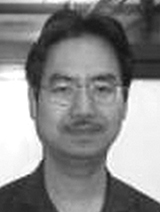 |  |
| Md. Atikur Rahman Sarker Ph.D. Student, Tokyo University of Agriculture and Technology | Yuki Ueno Student, Tokyo University of Agriculture and Technology | Chi-Hung Kelvin Chu Senior Planning Analyst, Con Edison of NY, Inc. | Ken Nagasaka Associate Professor, Department of Electrical and Electronics Engineering, Tokyo University of Agriculture and Technology |
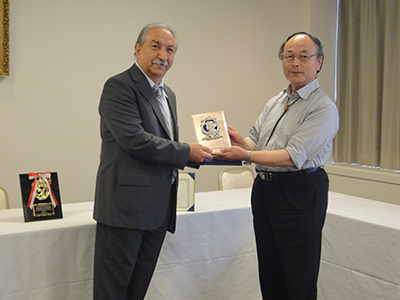
Fig. From Prof. Kaoru Hirota (right), the JACIII Editor-in-Chief, Prof. Ken Nagasaka received a plaque of the JACIII Young Researcher Award 2015 on behalf of Mr. Md. Atikur Rahman Sarker.
JACIII YOUNG RESEARCHER AWARD 2015 A Three-Dimensional Evaluation of EndoButton Displacement Direction After Anterior Cruciate Ligament Reconstruction in CT Image Using Tunnel Axis Yosuke Uozumi, Kouki Nagamune, Naoki Nakano, Kanto Nagai, Yuichiro Nishizawa, Yuichi Hoshino, Takehiko Matsushita, Ryosuke Kuroda, and Masahiro Kurosaka |
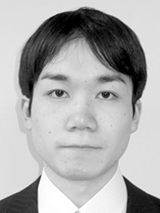 | 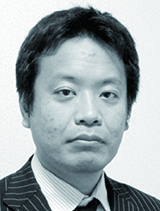 | 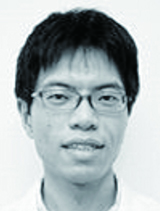 |  |  |
| Yosuke Uozumi Advanced Interdisciplinary of Science and Technology, Graduate School of Engineering, University of Fukui | Kouki Nagamune Associate Professor, Department of Human and Artificial Intelligent Systems, Graduate School of Engineering, University of Fukui | Naoki Nakano Graduate School of Medicine, Kobe University | Kanto Nagai Graduate School of Medicine, Kobe University | Yuichiro Nishizawa Researcher, Kobe University |
 | 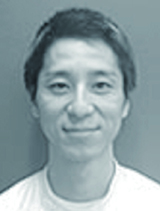 | 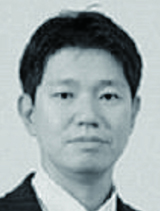 |  |
| Yuichi Hoshino Researcher, Kobe University | Takehiko Matsushita Researcher, Kobe University | Ryosuke Kuroda Associate Professor, Kobe University | Masahiro Kurosaka Professor, Orthopaedic Laboratory, Graduate School of Medicine, Kobe University |
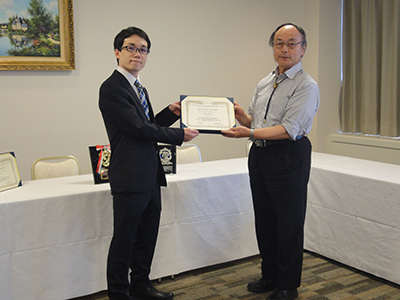
Fig. Mr. Yosuke Uozumi, the awardee of the JACIII Young Researcher Award 2015, received a certificate from Prof. Hirota.
single-award.php
JACIII Best Paper and Young Researcher Awards 2014
JACIII BEST PAPER AWARD 2014 Heuristic Algorithm for Attribute Reduction Based on Classification Ability by Condition Attributes Yasuo Kudo and Tetsuya Murai |
 |  |
| Yasuo Kudo Associate Professor, Graduate School of Engineering, Muroran Institute of Technology | Tetsuya Murai Associate Professor, Graduate School of Information Science and Technology, Hokkaido University |
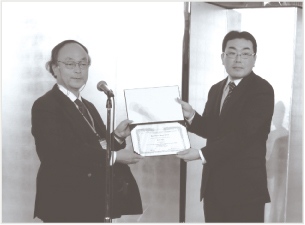
Fig. Assoc. Prof. Yasuo Kudo (right), the awardee of the Best Paper Award 2014, received a certificate from Prof. Kaoru Hirota (left), JACIII Editor-in-Chief, at the award ceremony on Dec. 5, 2014 in Kitakyushu, Japan.
JACIII YOUNG RESEARCHER AWARD 2014 Interest-Based Ordering for Fuzzy Morphology on White Blood Cell Image Segmentation Chastine Fatichah, Martin Leonard Tangel, Muhammad Rahmat Widyanto, Fangyan Dong, and Kaoru Hirota |
 |  |  |  |  |
| Chastine Fatichah Department of Computational Jc16-1-11_fatichah.jpg | Martin Leonard Tangel Department of Computational, Intelligence and Systems Science, Tokyo Institute of Technology | Muhammad Rahmat Widyanto Research Coordinator and Lecturer, Faculty of Computer Science, University of Indonesia | Fangyan Dong Assistant Professor, Department of Computational Intelligence and Systems Science, Tokyo Institute of Technology | Kaoru Hirota Department of Computational Intelligence and Systems Science, Tokyo Institute of Technology |
JACIII YOUNG RESEARCHER AWARD 2014 Concept of Fuzzy Atmosfield for Representing Communication Atmosphere and its Application to Humans-Robots Interaction Zhen-Tao Liu, Min Wu, Dan-Yun Li, Lue-Feng Chen, Fang-Yan Dong, Yoichi Yamazaki, and Kaoru Hirota |
 |  |  |  |  |
| Zhen-Tao Liu Department of Computational Intelligence and Systems Science, Tokyo Institute of Technology, School of Information Science and Engineering, Central South University | Min Wu Dean and Professor, School of Information Science and Engineering, Central South University | Dan-Yun Li School of Information Science and Engineering, Central South University | Lue-Feng Chen Department of Computational Intelligence and Systems Science, Tokyo Institute of Technology | Fang-Yan Dong Assistant Professor, Department of Computational Intelligence and Systems Science, Tokyo Institute of Technology |
 |  |
| Yoichi Yamazaki Assistant Professor, Department of Electrical, Electronic & Information Engineering, Kanto Gakuin University | Kaoru Hirota Professor, Department of Computational Intelligence and Systems Science, Tokyo Institute of Technology |